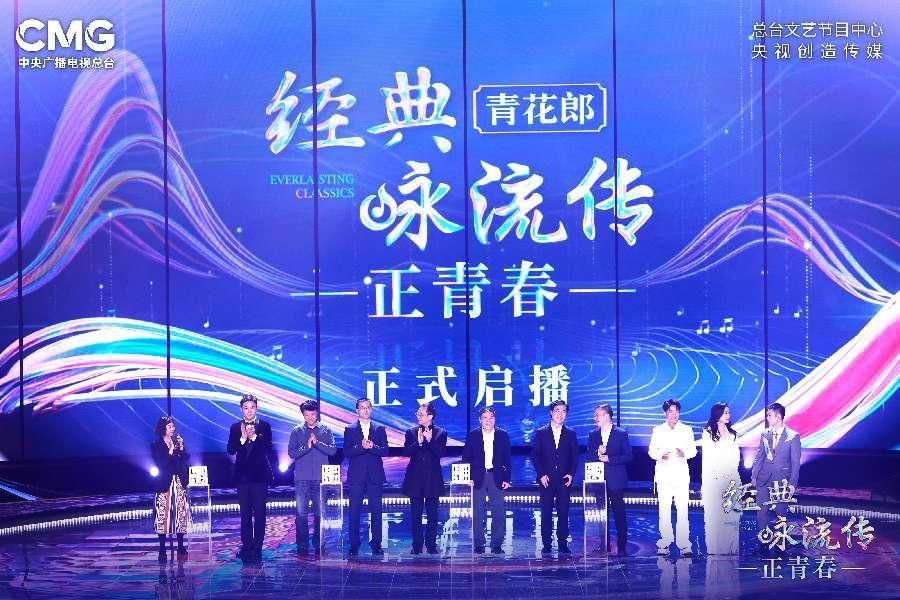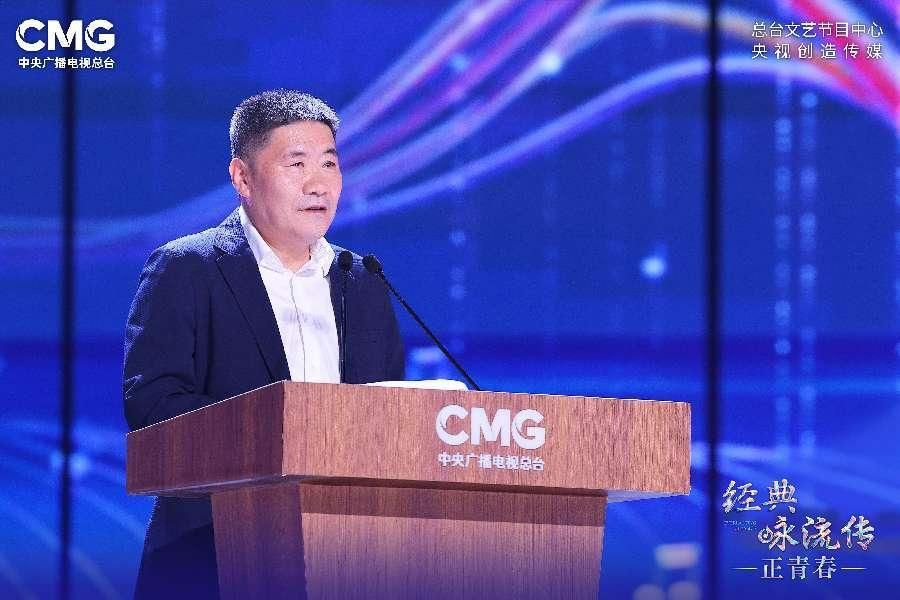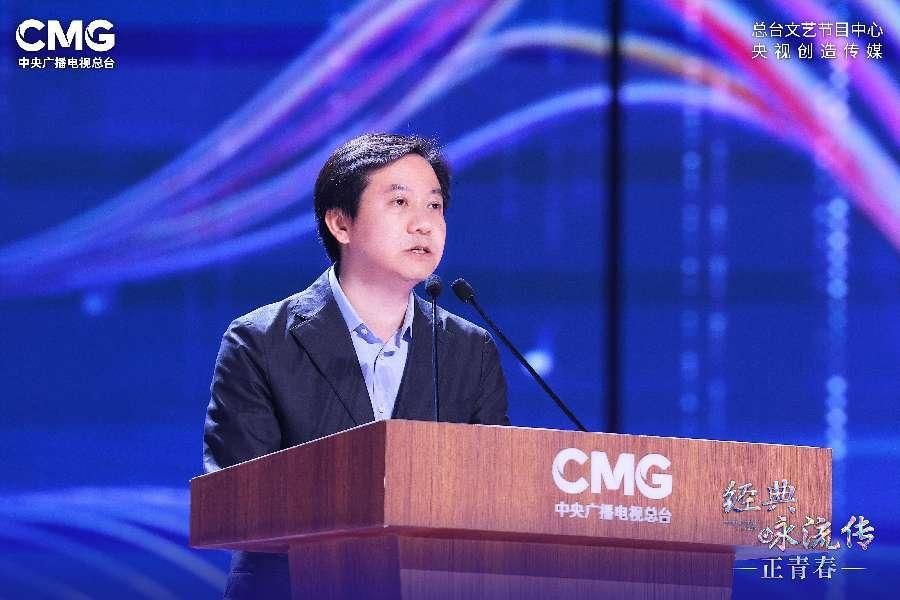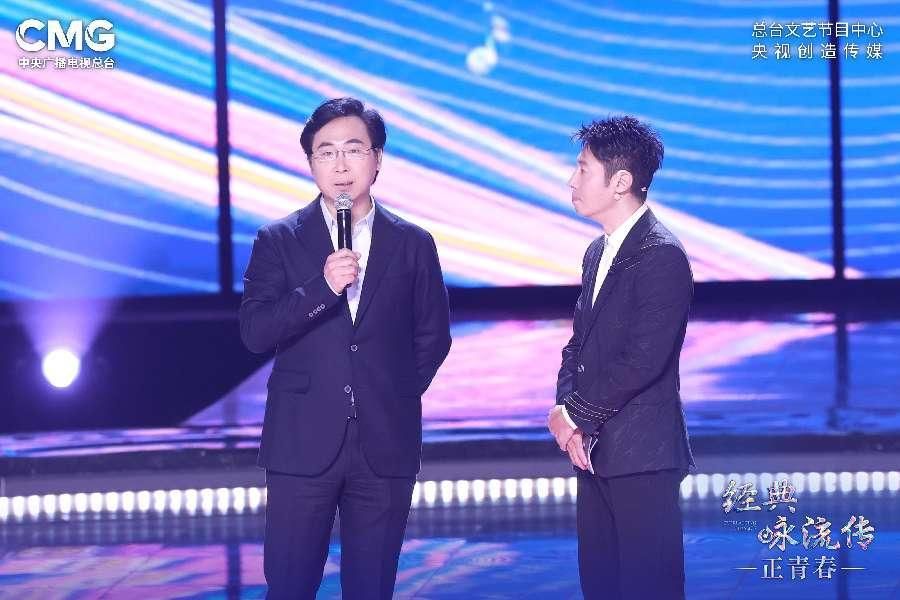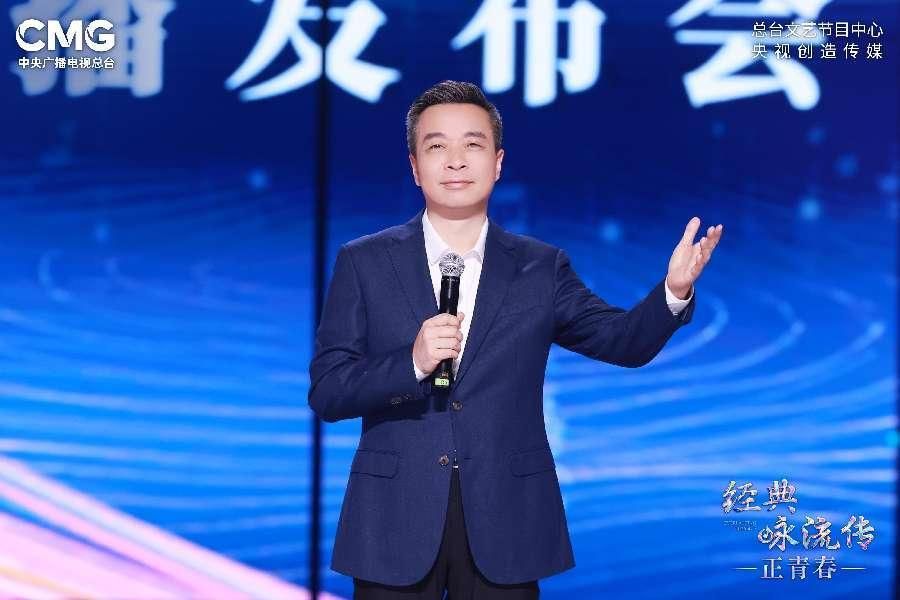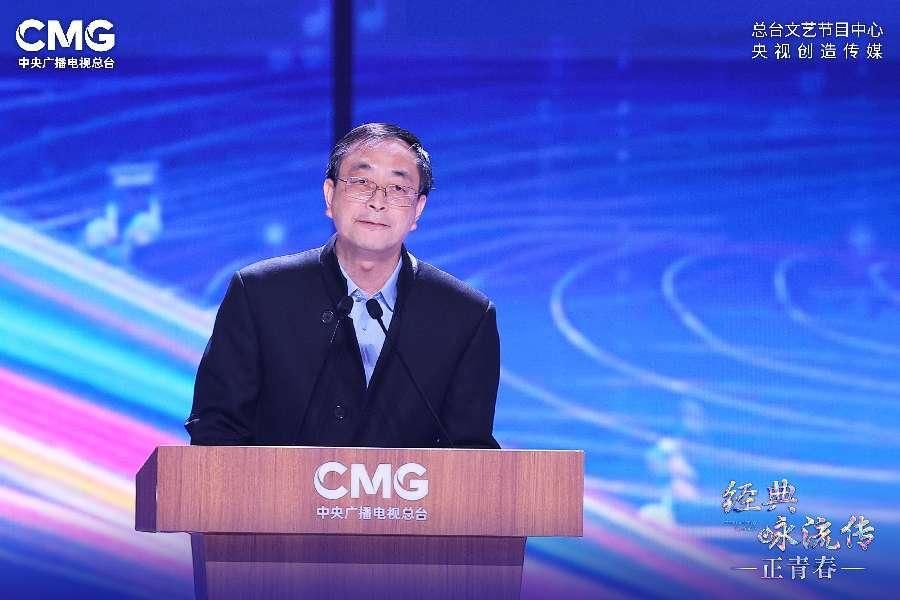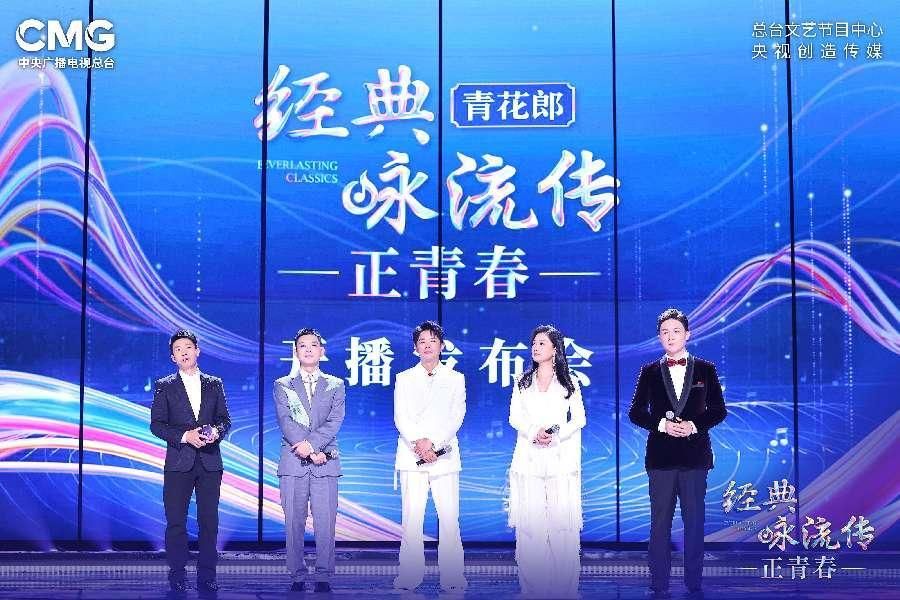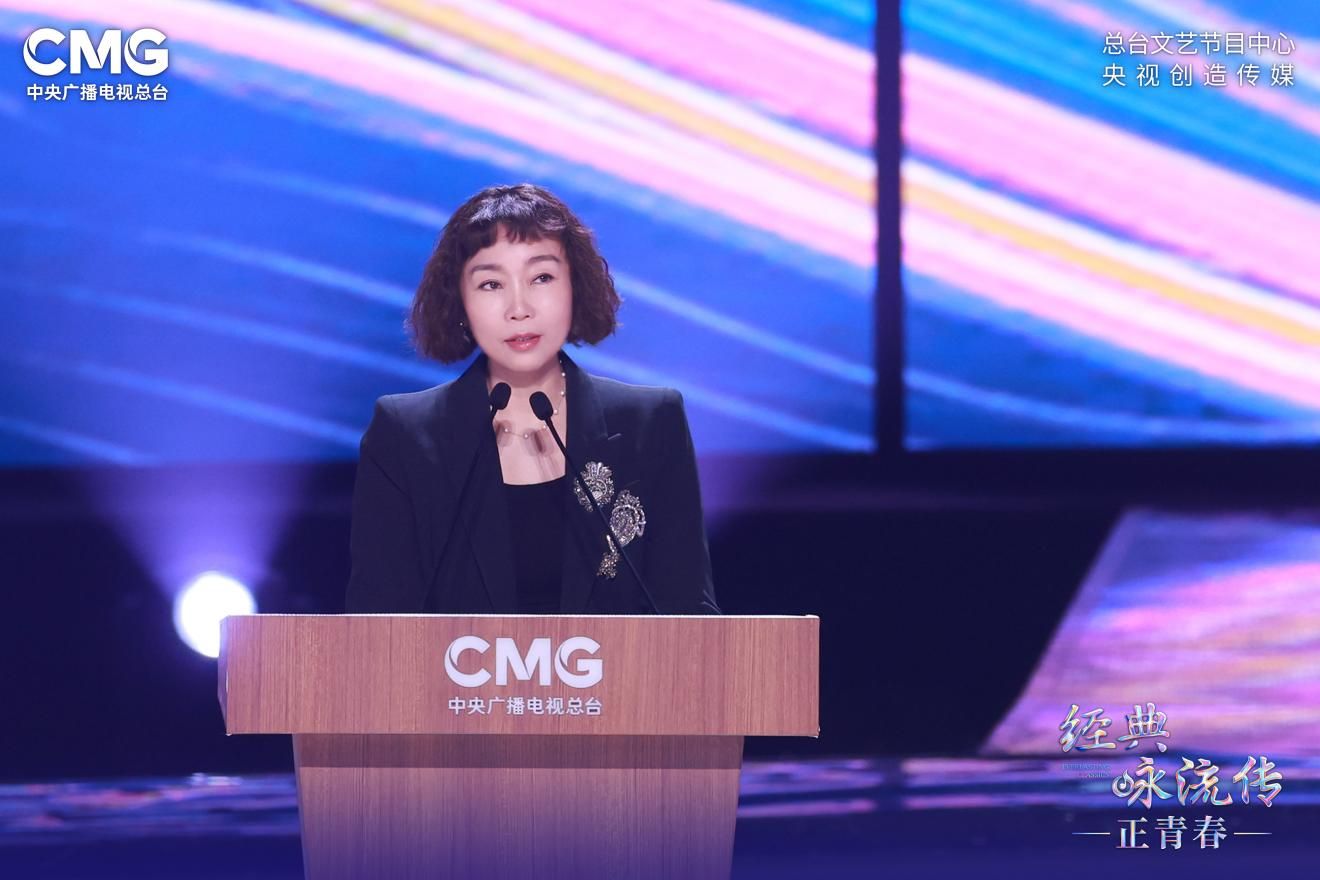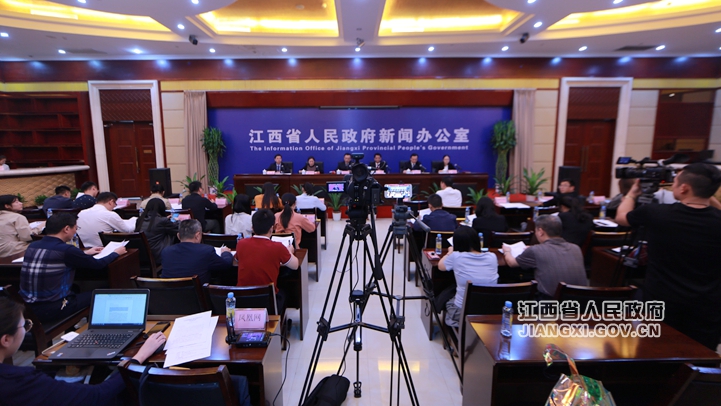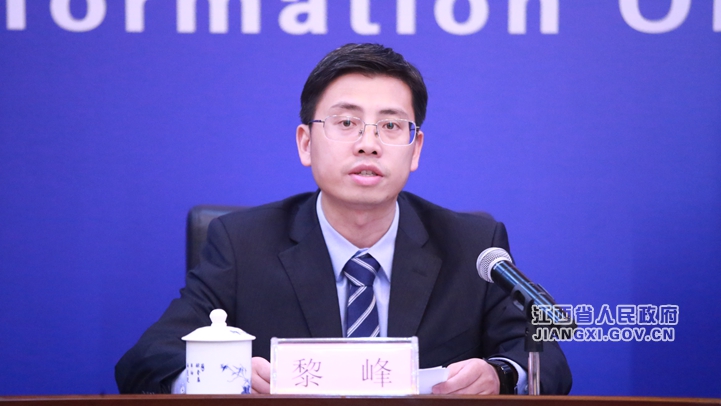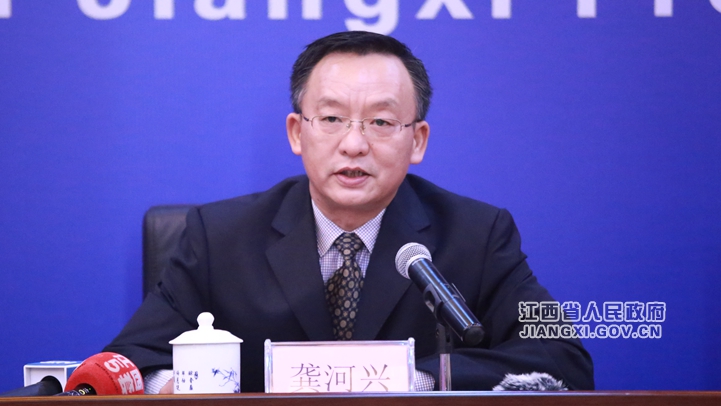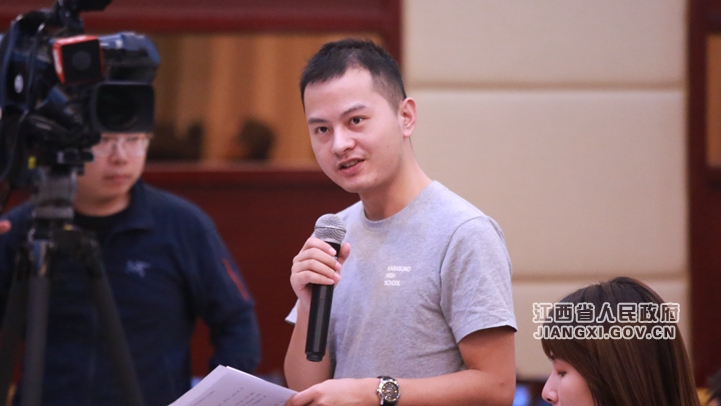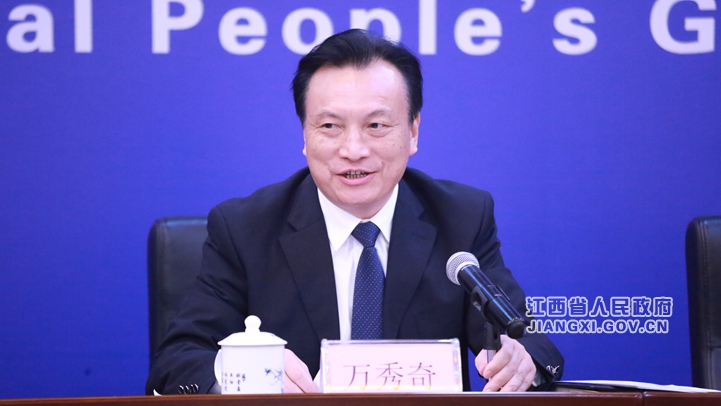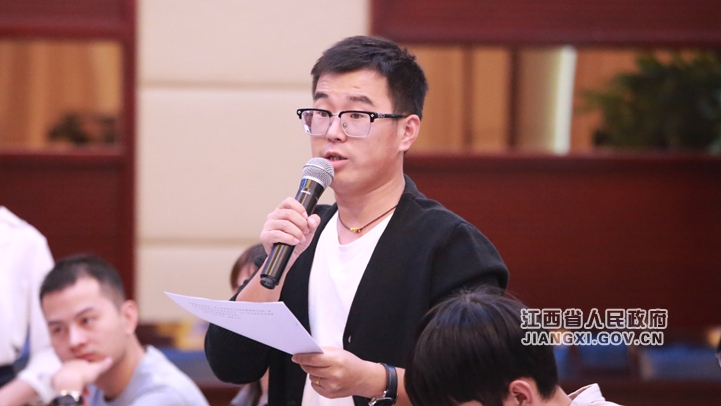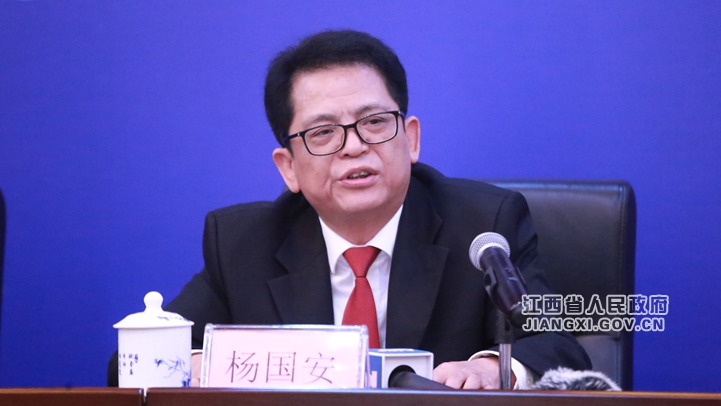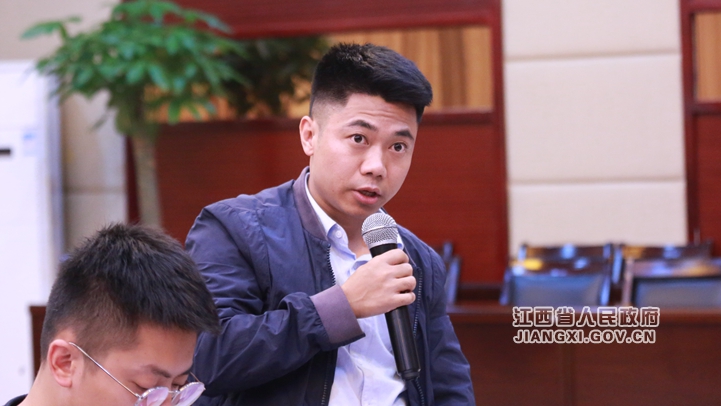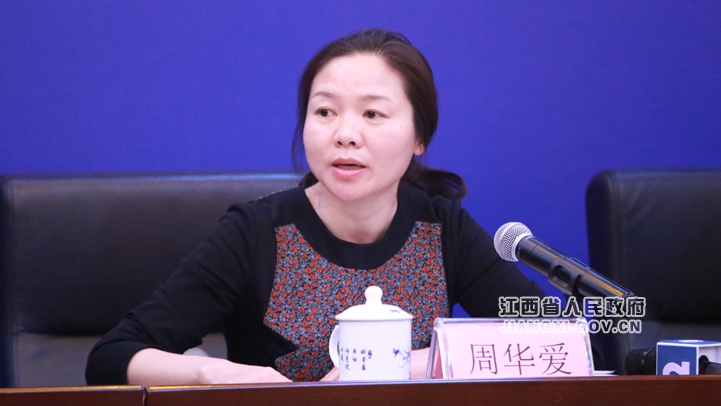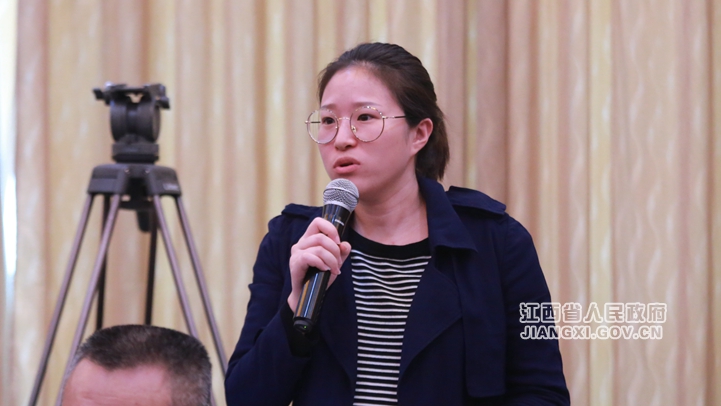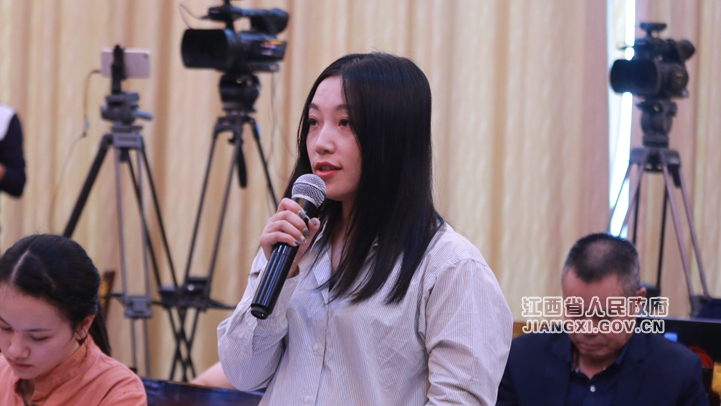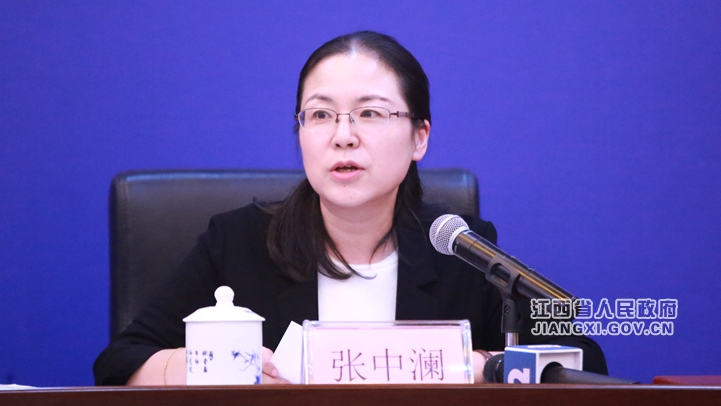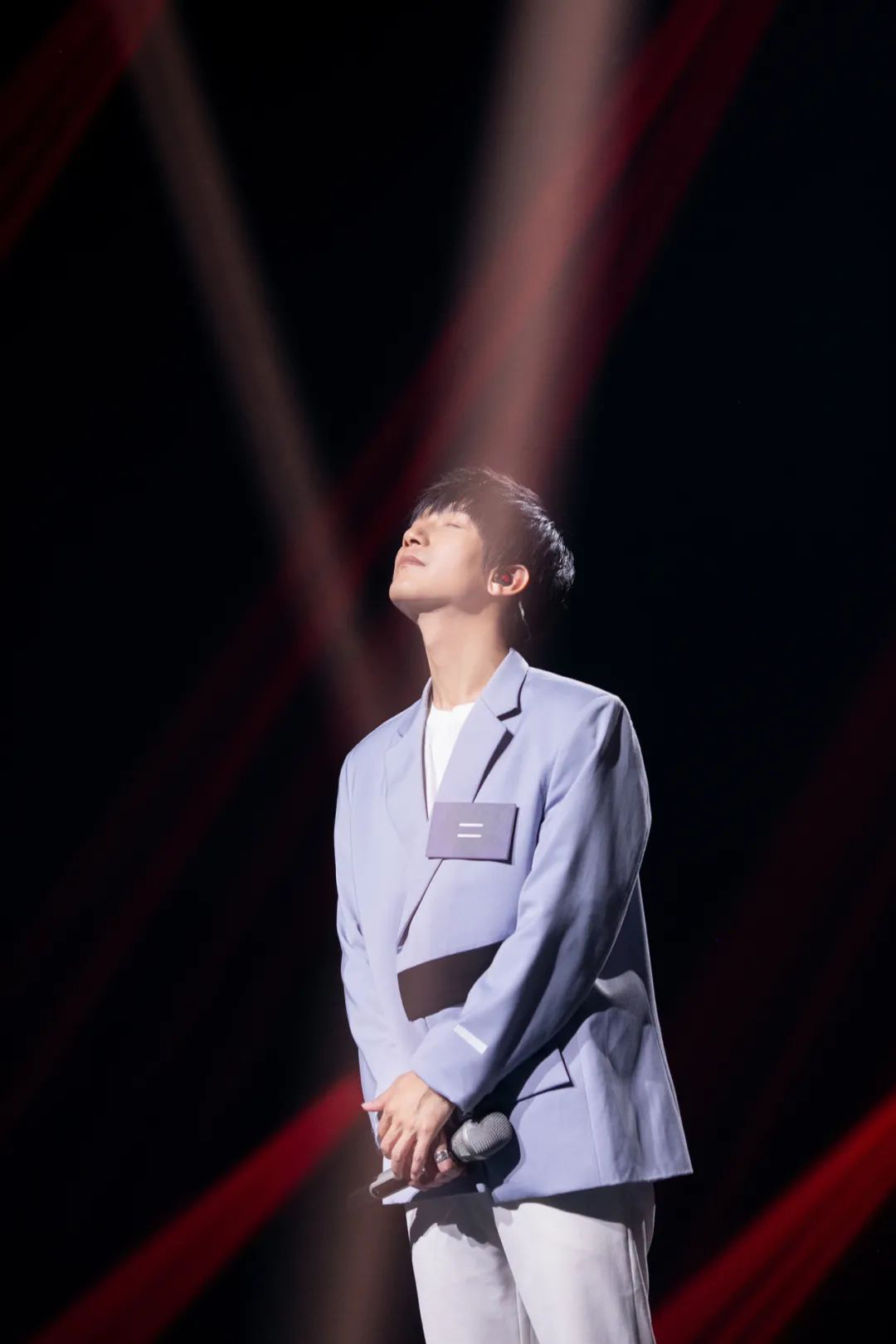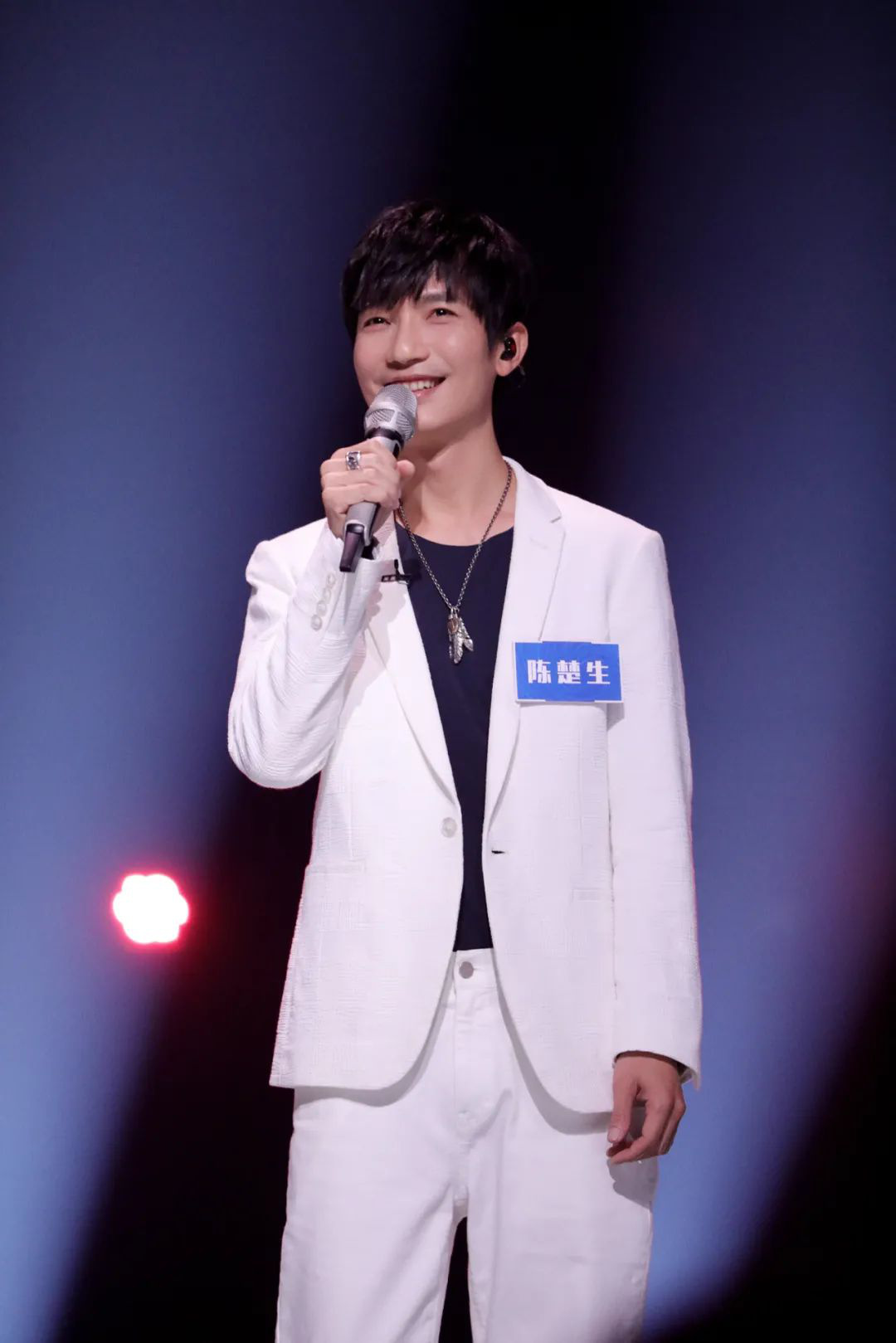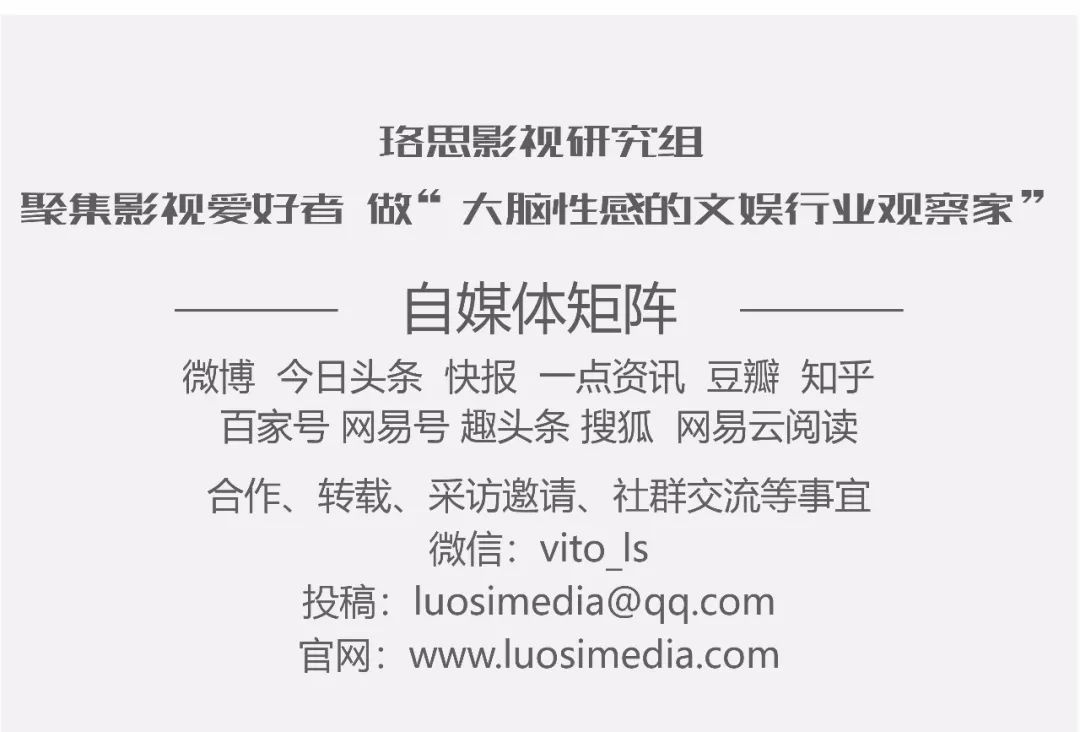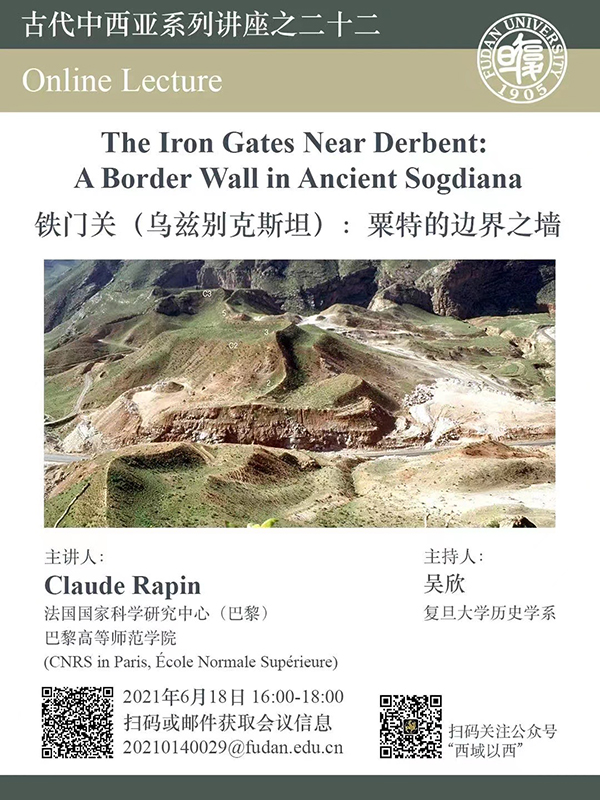
Tiemenguan (Uzbekistan): the border wall of Sogdian.
Time:June 18th (Friday) 16:00-18:00
Location:Wechat group of ancient Chinese and Western Asia series lectures
Speaker:Claude Rapin (archaeologist)
This lecture will focus on the wall of an artificial building next to tiemenguan, near Derbent, located in Besson, Uzbekistan. For ancient China people, tiemenguan was an important checkpoint on the Silk Road that passed through Central Asia and led to South Asia. Xuanzang and Qiu Chuji passed through this pass when they traveled westward, and Genghis Khan once camped here. By collecting archaeological data and rereading ancient texts, Claude Rapin will lead us to understand this side wall and its long-term evolution at the administrative, political and military levels. He will also lead us to discuss some controversial academic issues, such as the Sogdian territory in the pre-Guishuang period and the boundary definition from ancient times to the present.
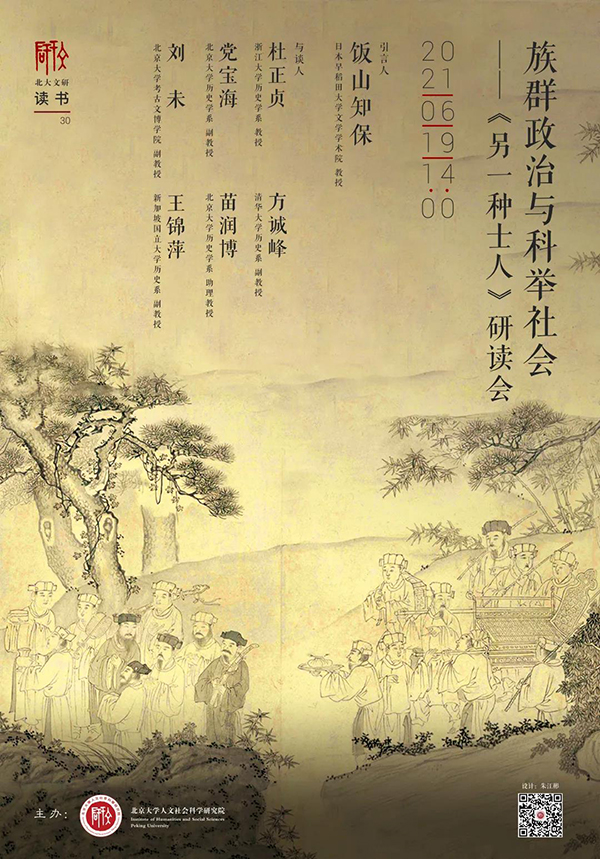
Ethnic Politics and Imperial Examination Society —— A Study Meeting of Another Scholar
Time:14:00 on June 19th (Saturday)
Location:Tencent conference
Speaker:Iiyama Zhibao (Professor, School of Literature, Waseda University, Japan)
"Another Scholar —— North China Society and Imperial Examination System in Jin and Yuan Dynasties" mainly investigates the overall atmosphere and environment of Han intellectuals under the rule of northern minorities in Jin and Yuan Dynasties. The author Iiyama knows Bao, mainly engaged in the study of social history of northern China from the 10th to the 17th century. On Saturday afternoon, Iiyama will talk with several guests online about this new book.
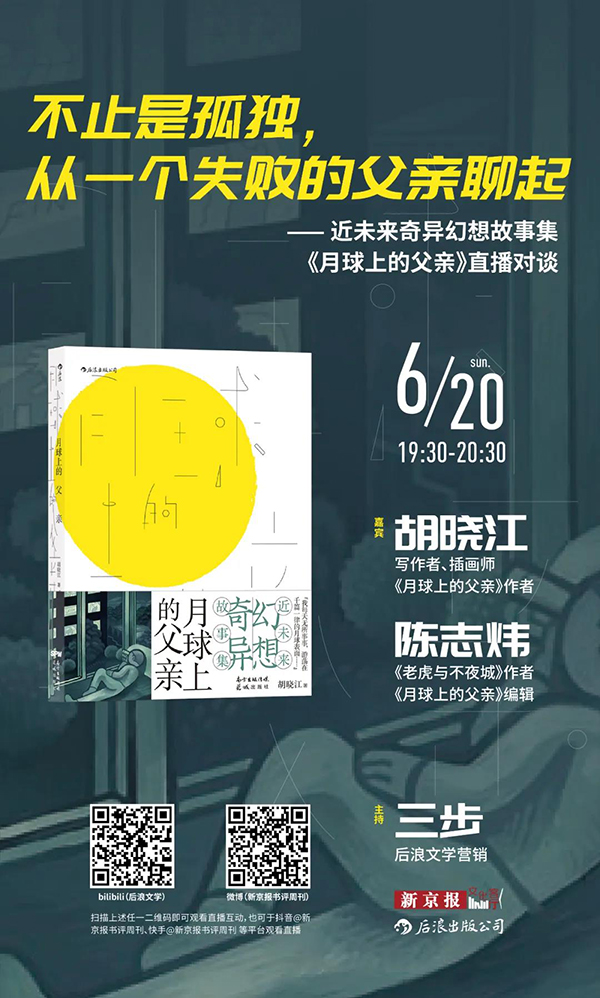
More than Loneliness, Talking from a Failed Father —— A Live Conversation of Father on the Moon, a collection of fantastic fantasy stories in the near future
Time:19:30 on Sunday, June 20th.
Location:Sina Weibo, Aauto Quicker, Tik Tok
Guest:Hu Xiaojiang (illustrator) and Chen Zhiwei (writer and editor)
Father on the Moon is a collection of novels with pictures and texts, which consists of 86 paintings and 44 novels. Stories interweave with each other and run in parallel. Besides the story of the father on the moon, there are many stories permeated with loneliness. Illustrator Hu Xiaojiang used novel writing to complete image narration and told a series of wonderful fantasy stories. On June 20th, Father’s Day, we invited author Hu Xiaojiang and editor Chen Zhiwei to talk about a failed father and share the surreal world full of desire and alienation in the book.
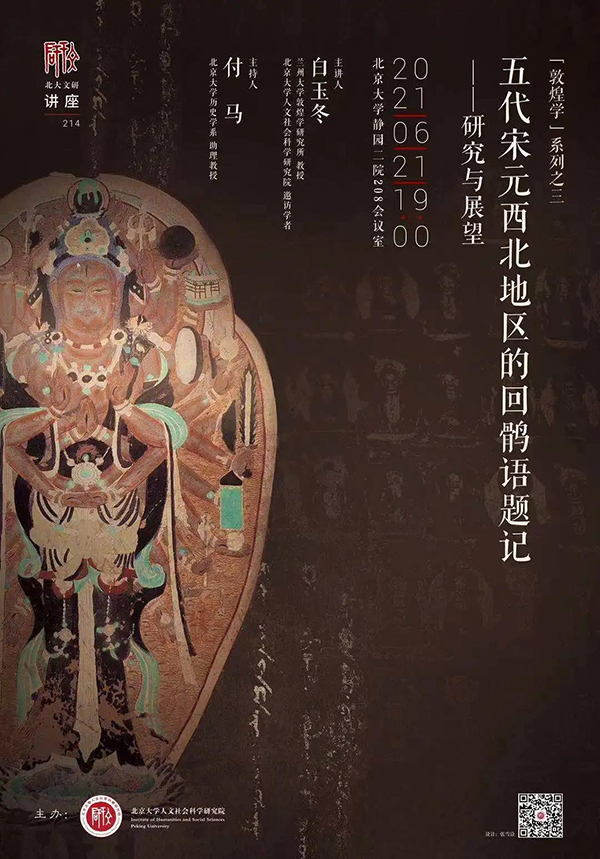
An Inscription of Uighur Language in the Northwest of the Five Dynasties, Song and Yuan Dynasties —— Research and Prospect
Time:19:00 on Monday, June 21st.
Location:Tencent conference
Speaker:Bai Yudong (Professor, Institute of Dunhuang Studies, Lanzhou University)
Taking the grottoes and temples in Dunhuang, Turpan, Beiting and Hohhot as the core, a number of multilingual inscriptions from the Five Dynasties, Song and Yuan Dynasties remain in the northwest. Inscriptions reflect the political power structure that supported grottoes and temples in history, as well as the belief of Buddhists, etc. They are precious historical materials. Among them, Uighur inscriptions are second only to Chinese in number, and the characters used include Runi, Uighur, Syrian, Brahmi and so on. Some of these inscriptions support the title of the Uighur ruling class of Buddhism, some reflect the writer’s belief background of Manichaeism, Nestorianism and Buddhism, and some are prayers. The interpretation and study of these inscriptions will help to describe the tour route of Uighur Buddhists and the history of Wutai Mountain belief, explore the real origin of "Shazhou Uighur" in the middle and late 11th century, show the real scene of the integration of Manichaeism, Nestorianism and Buddhism along the Silk Road, and dig out the truth of the spread and blending of Chinese and Tibetan Buddhism in the northwest. The historical linguistic value of these inscriptions needs to be further explored.
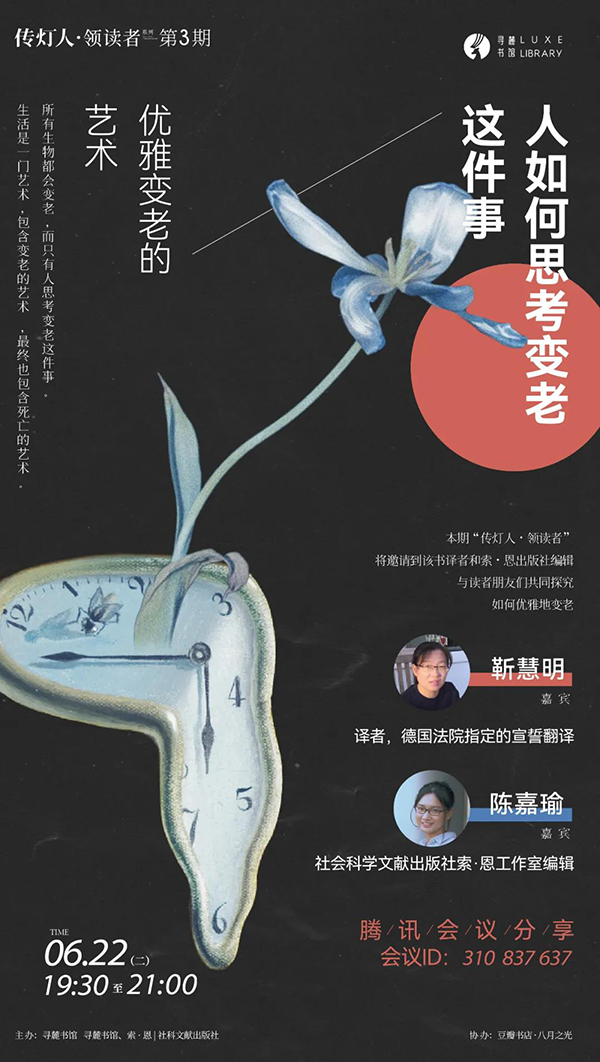
How do people think about getting old-the art of getting old gracefully
Time:June 22nd (Tuesday) 19:30-21:00.
Location:Tencent conference (ID: 310837637)
Guest:Jin Huiming (translator) and Chen Jiayu (book editor)
All living things get old, and only people think about getting old. Life is an art, including the art of getting old and finally the art of dying. On June 22nd, I read The Art of Graceful Aging: A Little Philosophy of a Better Life with translator Jin Huiming and book editor Chen Jiayu to understand and learn the philosophy of aging.
Attachment: Preview of offline activities
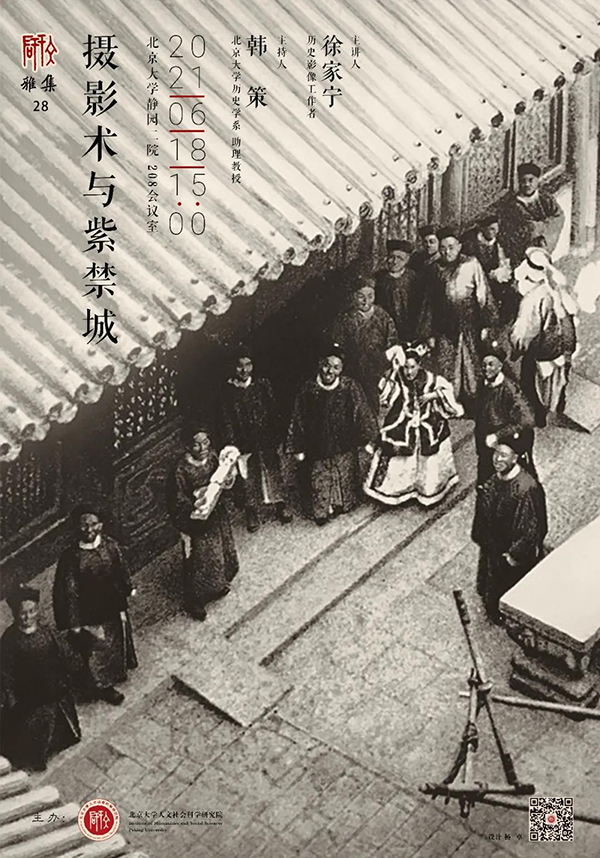
Beijing | Photography and the Forbidden City
Time:15:00 on Friday, June 18th.
Location:Room 208, Peking University Jingyuan Second Hospital, No.5 Summer Palace Road, Haidian District
Speaker:Xu Jianing (Historical Imager)
As a special building complex, the Forbidden City will almost become the focus of photography at every major node in China’s history. The barrier between China court and photography, a western art, was gradually broken in the long years of 50 or 60 years. In this process, we can see that photography made initial contact with court officials in the southern port city, which is far from the center of the empire. Slowly, more and more princes and ministers left personal images in front of the camera, and finally the queen mother, emperor and their daily activities, who were at the core of power, were included in the camera. This inevitable process of opening up in today’s understanding is clearly reflected in the photos about the Forbidden City and the royal family. These photos are kept as many aspects of historical research in different periods, and there is also room for discussion.
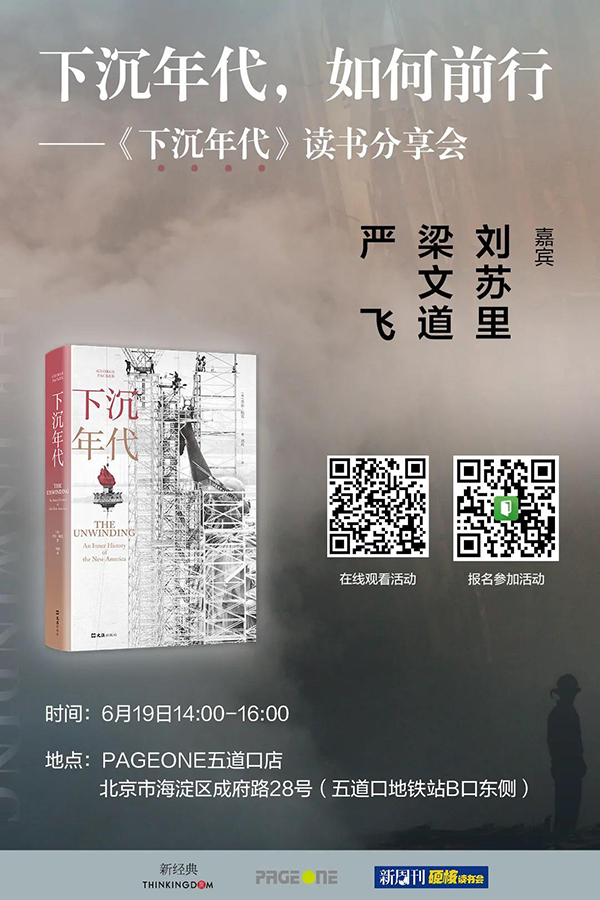
Beijing | Sinking Age, How to Move Forward —— Reading Sharing Meeting of Sinking Age
Time:June 19th (Saturday) 14:00-16:00
Location:PageOne Bookstore 2F, No.28 Chengfu Road, Haidian District
Guest:Liu Suli (founder of Wansheng Bookstore), Liang Wendao (writer and media person) and Yan Fei (associate professor, deputy dean and doctoral supervisor of Tsinghua University Sociology Department).
Economic stagflation and oil crisis, cocaine plague and AIDS spread, Internet bubble and Iraq war, manufacturing decline and subprime mortgage crisis, occupation of Wall Street and the rise of the Republican Party-in the past three decades, the United States, as the world hegemon, has faced many challenges, and "whether the United States is declining" has become a topic that will never decline. The sinking elegy of this generation and the social changes in the past 30 years have all been written into the nonfiction masterpiece The Age of Sinking by George Parker, winner of the American National Book Award. If the world is sinking, how should ordinary individuals move forward? This Saturday, we will invite three guests from different fields, Liu Suli, Liang Wendao and Yan Fei, to analyze the changes in the inner layer of American society and re-recognize a real America outside Hollywood by interpreting The Sinking Age.
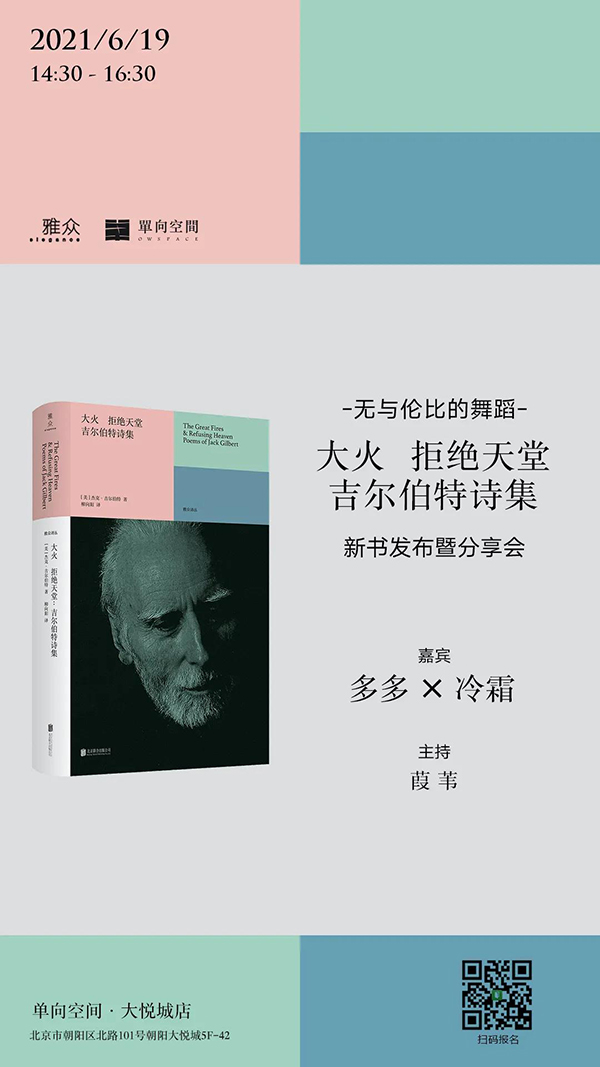
Beijing | Unparalleled Dance —— The release and sharing session of the new book "Fire Rejects Heaven: Gilbert’s Poems"
Time:June 19th (Saturday) 14:30-16:30
Location:5F One-way Space of Chaoyang Joy City, No.101 Chaoyang North Road, Chaoyang District
Guest:Duo Duo (Poet) and Leng Shuang (Associate Professor, School of Arts, Minzu University of China)
There are many contemporary poets in the United States. In contrast, Jack Gilbert doesn’t have a loud label, but people keep calling for "revaluation" and "rescue" Gilbert. The latest book "Fire Rejects Heaven: Gilbert’s Poems" combines two important poems of the poet "Fire" and "Rejects Heaven". On the afternoon of June 19th, I came to one-way space and listened to many famous poets. The poet and poetry critic Leng Shuang shared Gilbert’s poems with you and told about this legendary poet …
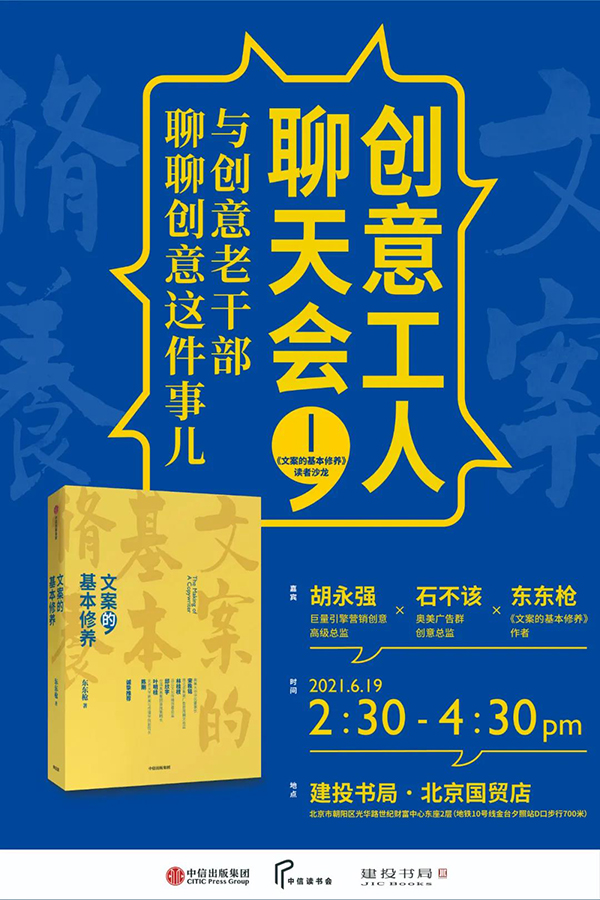
Beijing | Creative Workers’ Chat —— Talking about creative things with creative veteran cadres
Time:June 19th (Saturday) 14:30-16:30
Location:Building Investment Bookstore, Floor 2, East Tower, Century Fortune Center, Building 1, Yard 5, Guanghua Road, Chaoyang District
Guest:Dongdongqiang (creative worker), Hu Yongqiang (creative senior director of Huge Engine Marketing) and Shi Benying (creative director of Ogilvy Advertising Group).
Copywriter, or many creative workers, one of the biggest puzzles in their work is that they can’t find the criteria for judging creativity. Many times there is no direction, so we can only speculate without a clue. In Dongdong gun’s view, "self-cultivation is the foundation, and it is not just the foundation. Sometimes it is better to achieve the highest level than to cultivate. Part of the cultivation at that time refers to whether you can still stick to those basic correct understandings. " On June 19th, Jiantou Bookstore and CITIC Publishing House presented the reading salon of Basic Accomplishment of Copywriting for readers, and invited three guests, namely, author Dongdong Gun, creative senior director of Huge Engine Marketing, Hu Yongqiang and creative director of Ogilvy & Mather Advertising Group, to talk about creative work and its basic accomplishment.
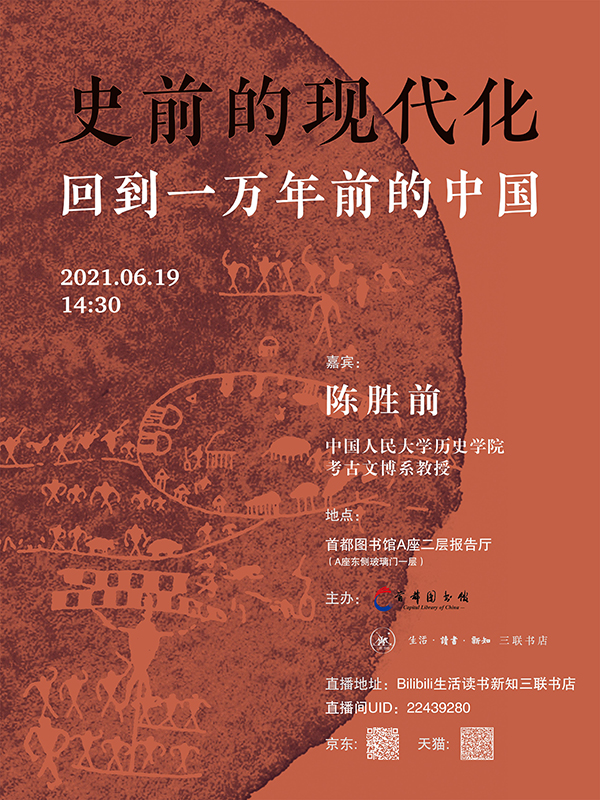
Beijing | Prehistoric Modernization —— Back to China 10,000 years ago
Time:June 19th (Saturday) 14:30-16:30
Location:Lecture Hall, Floor 2, Building A, Capital Library, No.88 East Third Ring South Road, Chaoyang District
Speaker: Chen Shengqian (Professor, Department of Archaeology and Culture, School of History, Renmin University of China)
If we had the chance to travel to China 10,000 years ago, what would we see? It was another major social change comparable to our current modernization process: human beings have adapted from hunting and gathering life for millions of years to agricultural production. China and West Asia are the two earliest centers of agricultural origin in the world. The agricultural origin of prehistoric China profoundly influenced the development of China culture. Back in China 10,000 years ago, we will also see other diverse cultural adaptation choices, which were the harbingers of the later pluralistic and integrated Chinese civilization. Understanding the process of prehistoric modernization is a key for us to understand the formation of China’s cultural tradition.
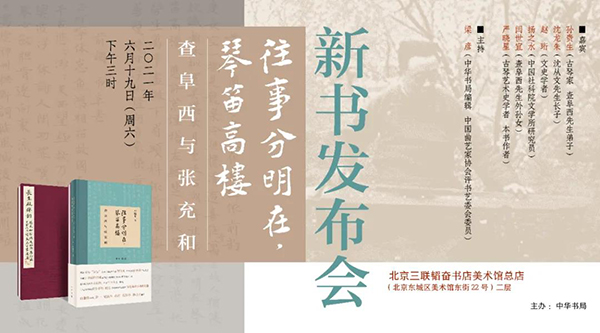
Beijing | New Book Launch Conference of "The Past is Clear, the Qindi Tall Building-Cha Fuxi and Zhang Chonghe"
Time:15:00 on June 19th (Saturday)
Location:Floor 2, Sanlian Taofen Bookstore, No.22 Art Museum East Street, Dongcheng District
Guest:Sun Guisheng (Guqin), Shen Longzhu (the eldest son of Mr. Shen Congwen), Zhao Heng (a scholar of literature and history), Yang Zhishui (a researcher at the Literature Institute of China Academy of Social Sciences), Yan Shiyi (the granddaughter of Mr. Cha Fuxi) and Yan Xiaoxing (a scholar of Guqin art history and a media person).
Yan Xiaoxing, a scholar and media person, wrote a new book "The past is clear, the piano and flute are high-rise-Chafuxi and Zhang Chonghe", which meticulously depicts a story in the history of guqin art in the 20th century, truly presents the little-known life experience of Chafuxi, a great guqin player, reproduces the elegance of ancient China in the chaos, and perfectly reproduces Zhang Chonghe’s long handwritten score. On Saturday afternoon, he will invite Mr. Cha Fuxi’s granddaughter Yan Shiyi, the guqin player Sun Guisheng, the eldest son of Mr. Shen Congwen, and scholars of literature and history Zhao Heng and Yang Zhishui to visit Sanlian Taofen Bookstore to share this new book with readers.
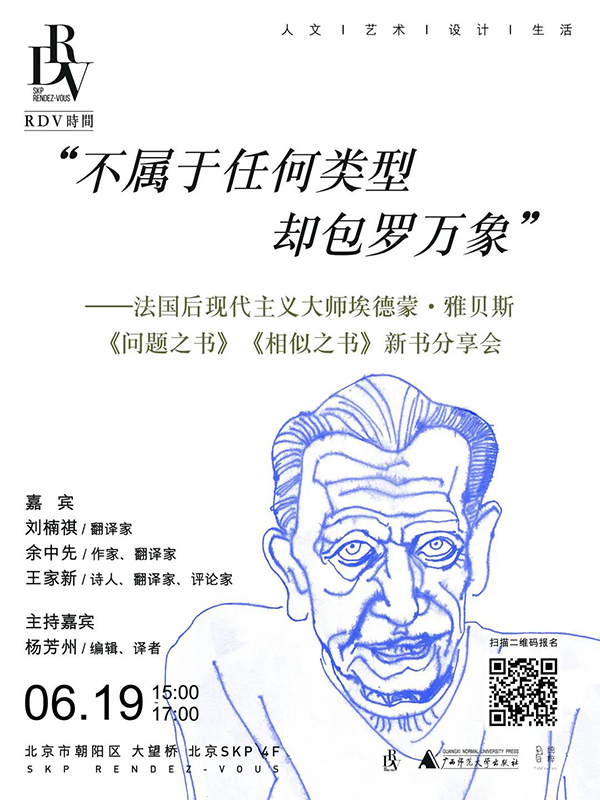
Beijing | "It doesn’t belong to any type, but it is all-encompassing" —— A new book sharing meeting of The Book of Problems and The Book of Similarity by French postmodernism master Edmund Jabes
Time:June 19th (Saturday) 15:00-17:00
Location:SKP RENDEZ-VOUS, 4th floor, Beijing SKP Shopping Center, No.87 Jianguo Road, Chaoyang District
Guest:Liu Nanqi (translator), Yu Zhongxian (writer and translator), Wang Jiaxin (poet, translator and critic), and Yang Fang (editor and translator).
Edmund Jabes’s writing is of great personal characteristics and style. On June 19th, we invited several guests to visit SKP in Beijing to discuss the rich literary, historical and philosophical implications behind The Book of Problems and The Book of Similarity written by Edmund Jabes, a French postmodern master.
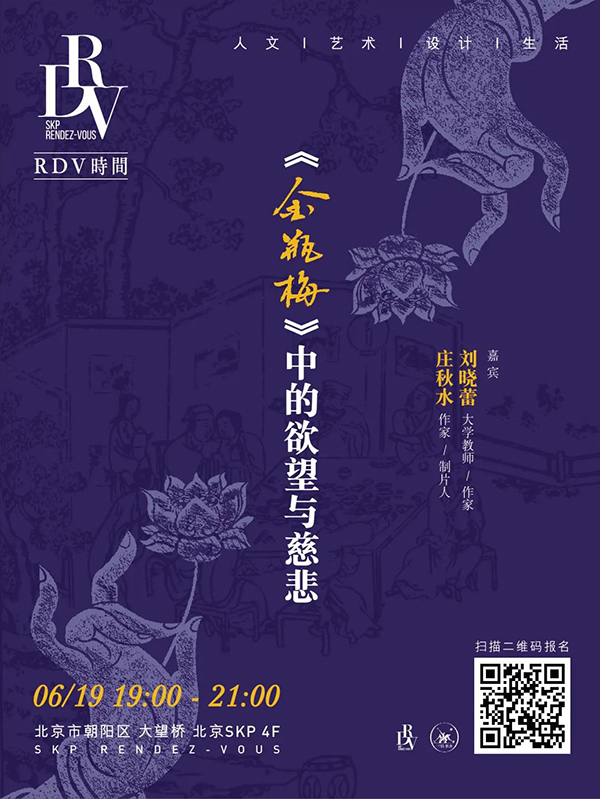
Beijing | Desire and Compassion in Jin Ping Mei
Time:June 19th (Saturday) 19:00-21:00.
Location:SKP RENDEZ-VOUS, 4th floor, Beijing SKP Shopping Center, No.87 Jianguo Road, Chaoyang District
Guest:Liu Xiaolei (university teacher and writer) and Zhuang Qiushui (writer and producer)
Jin Ping Mei is an absolutely realistic and honest work, but it becomes full of twists and turns and challenges in reading because it is too honest. Jin Ping Mei, as a desire, always reminds us to open our eyes and look at all beings. The characters in Jin Ping Mei are ourselves, and everyone has their greed and weakness, meanness and sorrows. At every key fork, if we want to enter the adult’s road, On June 19th, I listened to writers Liu Xiaolei and Zhuang Qiushui, shared the sentient beings in Jin Ping Mei with readers, and understood the complexity of human nature.
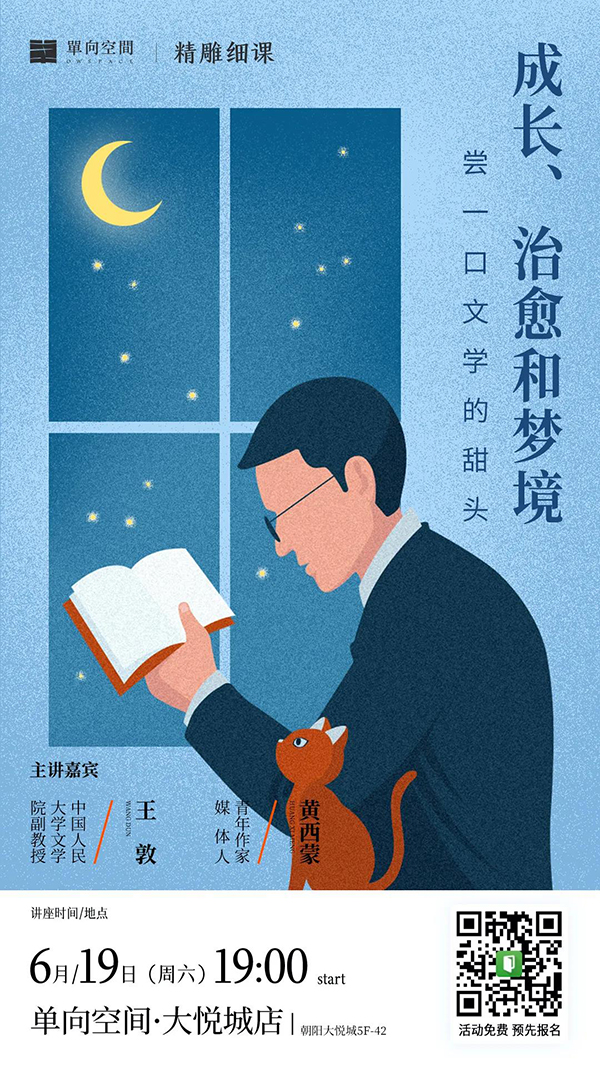
Beijing | Growth, Healing and Dreams —— Taste the sweetness of literature
Time:June 19th (Saturday) 19:00-21:00.
Location:5F One-way Space of Chaoyang Joy City, No.101 Chaoyang North Road, Chaoyang District
Guest:Wang Dun (Associate Professor, School of Literature, China Renmin University) and Huang Ximeng (writer and media person).
We often hear that this is an era in which literature is marginalized, but it is precisely an era in which literature is pervasive. Whether watching movies, following dramas, listening to songs, playing games, or even playing coslay, script killing and escaping from the secret room, we are all dealing with literature. People who really have nothing to do with literature do not exist. When we no longer hold the obsession with serious reading, we will taste the sweetness of literature, complete the growth of personality in the fictional "heroic journey", or realize individual redemption in the literary dream.

The Unique Charm of Bilingual Reading in Beijing | Dr. Seuss —— A series of new book releases of "Dr. Seuss Classic Bilingual Graded Reading"
Time:June 20th (Sunday) 10:00-11:30.
Location:Building Investment Bookstore, Floor 2, East Tower, Century Fortune Center, Building 1, Yard 5, Guanghua Road, Chaoyang District
Guest:Chen Yaping (Professor, School of English, Beijing Foreign Studies University), Yi Yan (Associate Professor, School of English, Beijing Foreign Studies University), Uncle Snail (English Talent), Yanzi (English Talent) and Yanzi’s mother (English Talent).
Dr. Seuss’s works are English enlightenment books that have been ranked in the reading list of American primary and secondary school students all the year round. On June 20th, Jiantou Bookstore and Relay Publishing House presented readers with a series of new book conferences on "Dr. Seuss Classic Bilingual Graded Reading". Professor Chen Yaping, director of China Children’s Language Research Center of Beijing Foreign Studies University, associate professor Yi Yan and well-known English learning bloggers were invited to jointly interpret the significance of early childhood reading and the pain points of English learning, explain in detail the tips of Dr. Seuss’s English learning and explore the tips of English enlightenment.
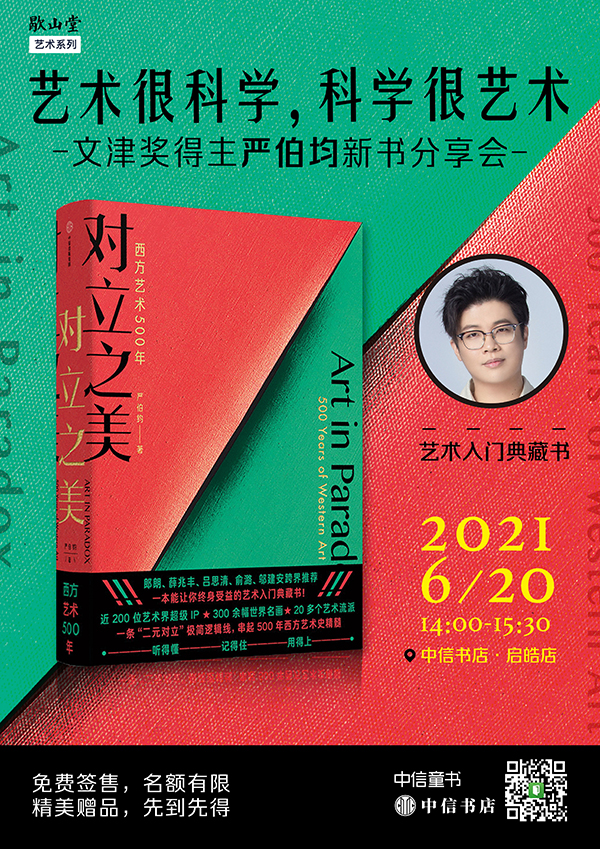
Beijing | Art is very scientific, and science is very artistic —— A new book sharing meeting of Yan Bojun, winner of Wenjin Prize
Time:June 20th (Sunday) 14:00-15:30
Location:West Gate CITIC Bookstore, Floor 1, Qihao Building, No.8 Xinyuan South Road, Chaoyang District
Speaker:Yan Bojun (popular science writer and art researcher)
Seurat’s Sunday afternoon in Big Bowl Island uses the same principle as modern inkjet printers. Vermeer, the author of The Girl with Pearl Earrings, probably understood the principle of "pinhole imaging" early. The interface design of Apple’s mobile phone is closely related to minimalism … Who said that art is emotional? Art is actually very scientific! What is the relationship between art and science? Yan Bojun, winner of Wenjin Award, talks with you about the history of western art with his new book "The Beauty of Opposites: 500 Years of Western Art"!
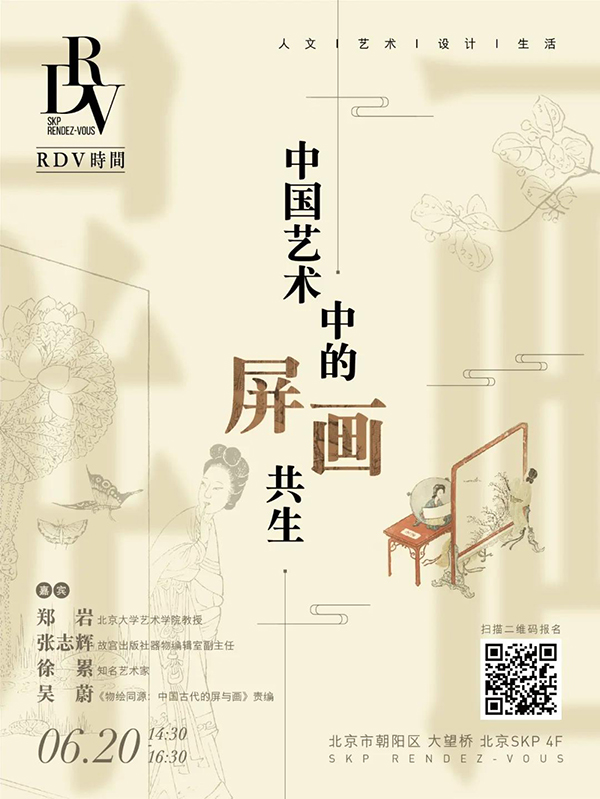
Screen painting symbiosis in Beijing | China art
Time:June 20th (Sunday) 14:30-16:30
Location:SKP RENDEZ-VOUS, 4th floor, Beijing SKP Shopping Center, No.87 Jianguo Road, Chaoyang District
Guest:Zheng Yan (Professor of Peking University Art Institute), Zhang Zhihui (Deputy Director of the Warehouse Editing Room of the Forbidden City Press), Xu Lei (Artist) and Wu Wei (Book Editor).
Screen and painted screen are not only an extremely rich and complicated historical phenomenon in the history of China, but also an important medium for modern Chinese and foreign exchanges. In order to sort out the existence and development of painting screen in ancient art and visual culture, Professor Wu Hong invited five scholars, including Li Qingquan, Zheng Yan, Huang Xiaofeng, Zhang Zhihui and Lin Weizheng, to study and write articles on the related topics of traditional painting screen. The research results have recently been assembled into a book, The Same Origin of Things and Paintings: Screens and Paintings in Ancient China, which was published by Shanghai Calligraphy and Painting Publishing House. On June 20th, we invited two authors of the book, Zheng Yan, a professor at Peking University Art Institute, Zhang Zhihui, deputy director of the utensils editing room of the Forbidden City Publishing House, and Xu Lei, a famous artist, to visit SKP in Beijing, and to interpret the position and significance of "painting screen" in the ancient art and life of China from two aspects of painting and furniture.
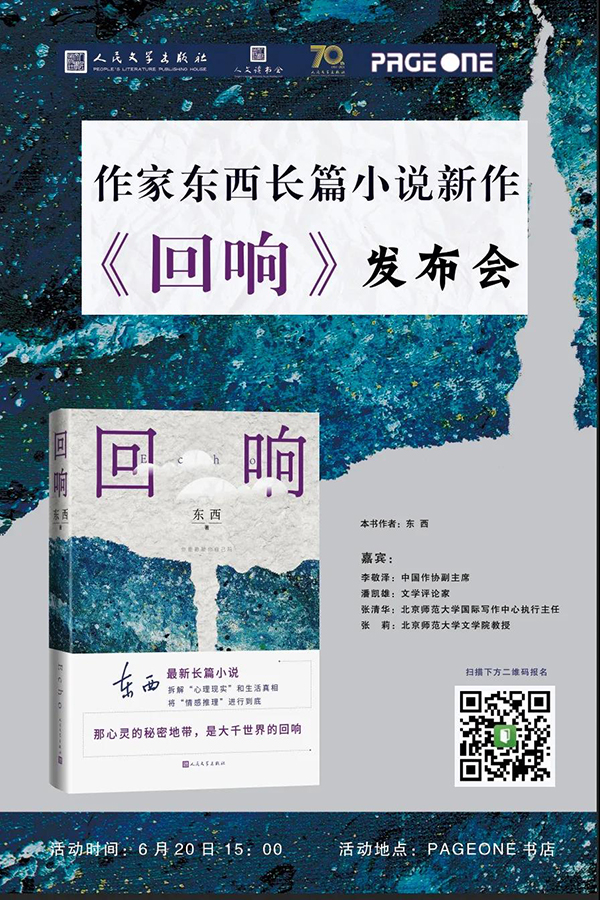
Beijing | Press Conference of the Writer’s New Novel "Echo"
Time:June 20th (Sunday) 15:00-17:00
Location:PageOne Bookstore 3F, Building 1, Yard 13, Langfang Toutiao, Xicheng District
Guest:Li Jingze (critic, writer), Pan Kaixiong (editor and literary critic), Zhang Qinghua (professor of Beijing Normal University), Zhang Li (professor of Beijing Normal University), Dongxi (writer).
In addition to maintaining a consistent writing style, Echo has a more objective and profound writing and a deeper understanding of characters and reality, which is more readable than any previous one. On the afternoon of June 20th, the writer Dongxi will bring his new book "Echo" to meet the long-awaited readers at PAGEONE Beijing Square Store. At that time, he will talk with Li Jingze, vice chairman of Chinese Writers Association, Pan Kaixiong, literary critic, Zhang Qinghua, executive director of Beijing Normal University’s International Writing Center, and Zhang Li, a professor at Beijing Normal University’s College of Literature, about Reverberation and the story behind it, and about literary creation and the development of the times.
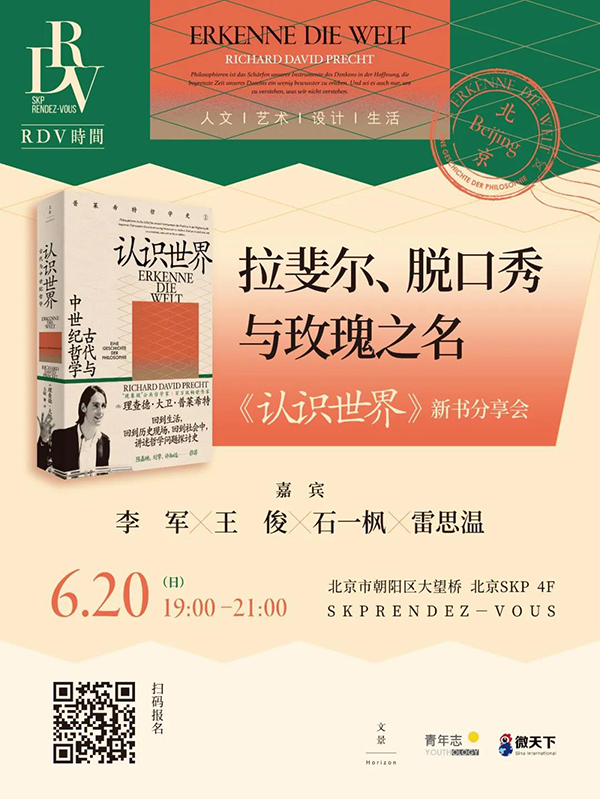
Beijing | Raphael, Talk Show and the Name of the Rose —— Sharing Meeting of the New Book Understanding the World
Time:June 20th (Sunday) 19:00-21:00.
Location:SKP RENDEZ-VOUS, 4th floor, Beijing SKP Shopping Center, No.87 Jianguo Road, Chaoyang District
Guest:Li Jun (Professor of Central Academy of Fine Arts), Wang Jun (Professor of Philosophy Department of Zhejiang University), Shi Yifeng (Writer) and Lei Siwen (Associate Professor of Philosophy College of China Renmin University).
What kind of cross-border drama is it when philosophy, art, novels and rock music come together? What kind of sparks can cold ideological criticism, lofty architectural art, tortuous storyline and restless guitar melody collide? These fields are by no means independent of each other. They all influence and shape each other. On June 20th, we invited Li Jun, a professor from Central Academy of Fine Arts, Wang Jun, a professor from Zhejiang University, Shi Yifeng, a young writer, and Lei Siwen, an associate professor from Renmin University of China, to talk about the mutual influence and inspiration among philosophy, art, literature and music.
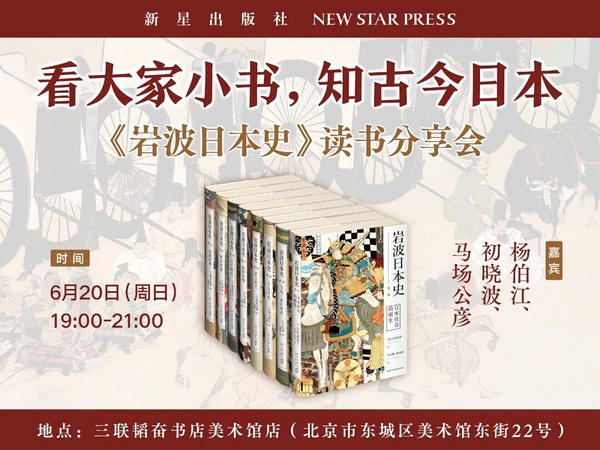
Beijing | Read everyone’s little books and learn about Japan in ancient and modern times —— Reading and sharing session of Iwabo’s Japanese History
Time:June 20th (Sunday) 19:00-21:00.
Location:Sanlian Taofen Bookstore, No.22, Art Museum East Street, Dongcheng District
Guest:Yang Bojiang (Director, Researcher and Doctoral Supervisor of Institute of Japanese Studies, Chinese Academy of Social Sciences), Chu Xiaobo (Professor of Peking University Institute of International Relations, Director of Center for Modern Japanese Studies and Doctoral Supervisor), and Masahiko (former editor-in-chief of Yanbo Bookstore and "foreign expert" of Japanese Department of Peking University Foreign Studies University).
The series "Iwabo Japanese History" is a set of humanistic common sense books on Japanese general history, which is edited by Iwabo Bookstore in Japan and compiled by many Japanese scholars. It is a Japanese general history. This introduction invited experts and scholars in the field of Japanese history from four places across the Taiwan Strait as translators, hoping to fill the publishing gap in Japanese history in China. On Sunday afternoon, we invited three guests to share this series with you.
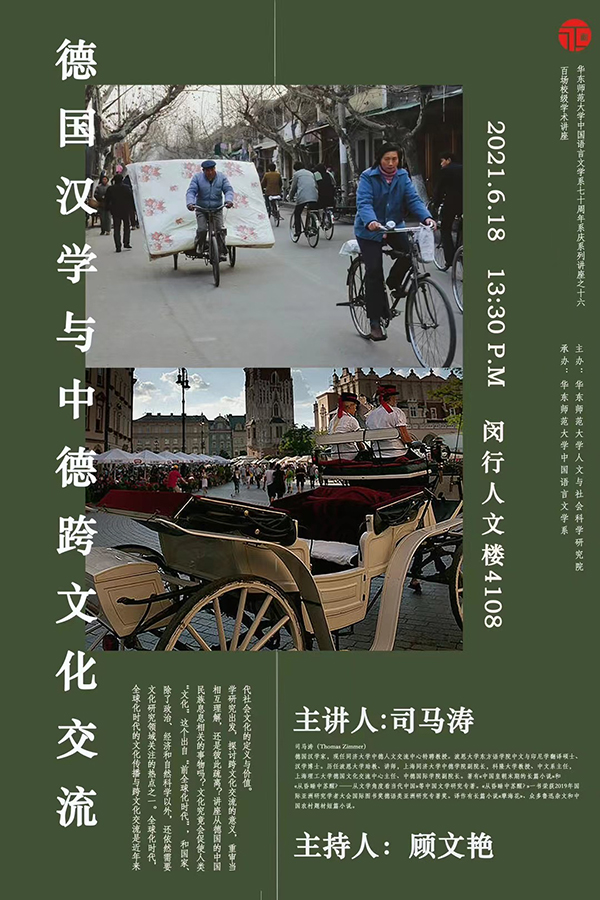
Shanghai | German Sinology and Cross-cultural Communication between China and Germany
Time:13:30 on Friday, June 18th.
Location:Room 4108, Humanities Building, East China Normal University, No.500 Dongchuan Road, Minhang District
Speaker:Sima Tao (Sinologist, distinguished professor, Sino-German Humanities Exchange Center, Tongji University)
Cultural communication and cross-cultural communication in the era of globalization is one of the hot spots in the field of cultural research in recent years. In the era of globalization, besides politics, economy and natural science, do we still need "culture", which comes from the "pre-globalization era" and is closely related to the country and the nation? Will culture promote human understanding or alienate each other? Starting from German China studies, the lecture explores the significance of cross-cultural communication and reexamines the definition and value of contemporary social culture.
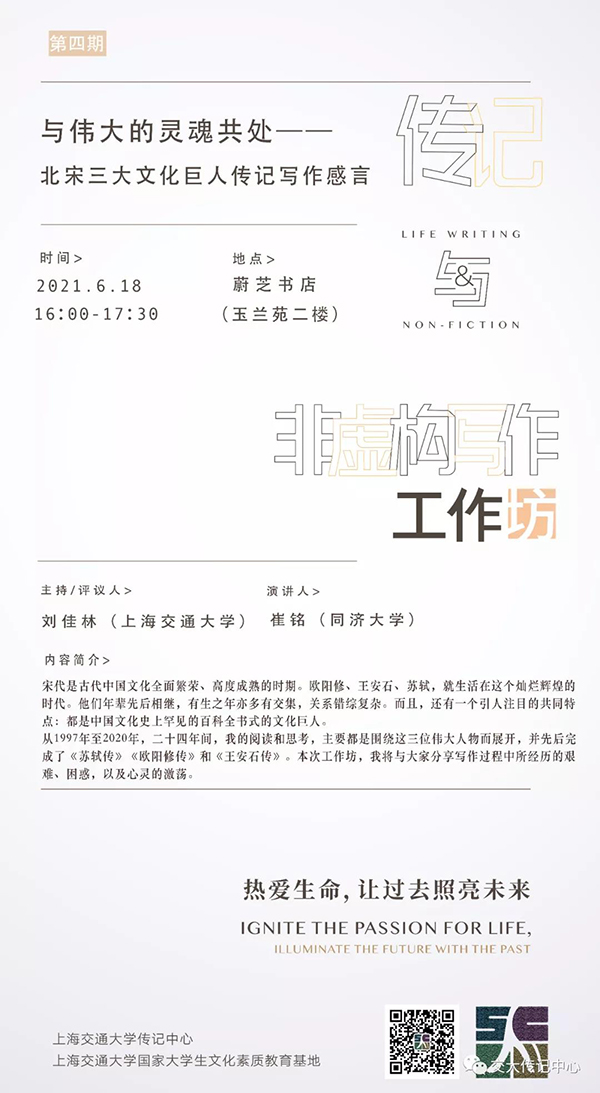
Shanghai | Coexisting with the Great Soul —— Comments on Biography Writing of Three Cultural Giants in Northern Song Dynasty
Time:June 18th (Friday) 16:00-17:30.
Location:Weizhi Bookstore, 2nd Floor, Yulanyuan, Shanghai Jiaotong University, No.800 Dongchuan Road, Minhang District
Speaker:Cui Ming (Associate Professor, School of Humanities, Tongji University)
The Song Dynasty was a period of comprehensive prosperity and high maturity of ancient China culture. Ouyang Xiu, Wang Anshi and Su Shi lived in this splendid era. Their generations have been one after another, and there are many intersections in their lifetime, and their relationship is complicated. Moreover, there is a striking common feature: they are all rare encyclopedic cultural giants in the cultural history of China. During the twenty-four years from 1997 to 2020, Cui Ming’s reading and thinking mainly revolved around these three great figures, and successively completed Su Shichuan, Ouyang Xiu Biography and Wang Anshi Biography. In this workshop, Cui Ming will share with you the difficulties, confusion and spiritual agitation experienced in the writing process.
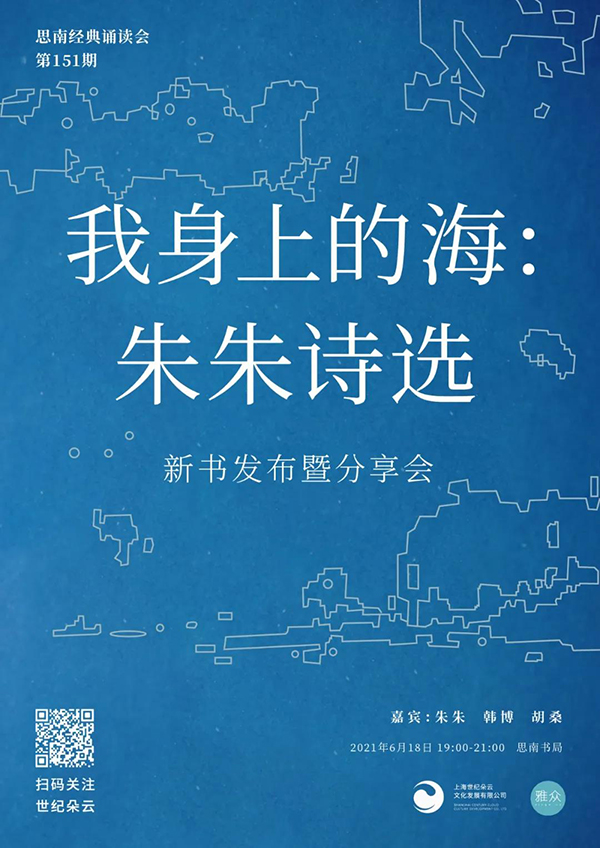
Shanghai | The Sea on Me: Selected Poems of Zhu Zhu’s New Book Release and Sharing Meeting
Time:June 18th (Friday) 19:00-21:00.
Location:Sinan Bookstore, No.517 Fuxing Middle Road, Huangpu District
Guest:Zhu Zhu (poet, curator and art critic), Han Bo (poet, artist and novelist) and Hu Sang (poet and translator).
The Sea on Me: Selected Poems of Zhu Zhu is the first anthology of poems written by the poet Zhu Zhu in 30 years. On the evening of June 18th, three poets, Zhu Zhu, Han Bo and Hu Sang, will visit Sinan Bookstore and take you to read Zhu Zhu’s poems with "full details and profound interior".
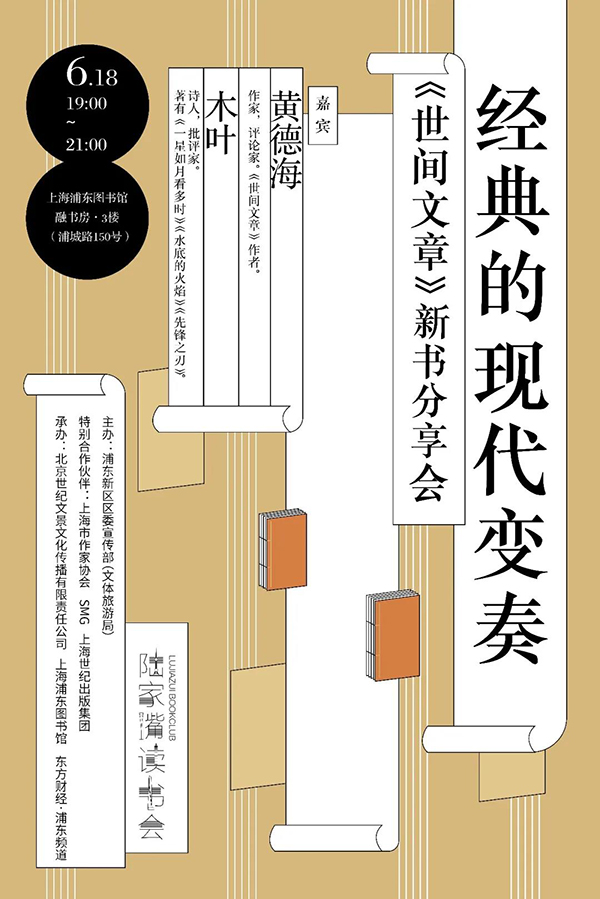
Shanghai | Classic Modern Variations —— Sharing Meeting of New Books of Worldly Articles
Time:June 18th (Friday) 19:00-21:00.
Location:3/F, No.150 Pucheng Road, Pudong New Area, Shanghai Pudong Library Rong Study Room
Guest:Huang Dehai (deputy editor-in-chief of Sinan Literature) and Konoha (poet and critic)
History has been growing because of our existence and attention. A visit to the original works of cultural classics in Chinese history is a kind of reassessment and inheritance, and it also contains a survey of the present. It is in the constant variation and circulation that those classics reveal eternal charm and enlightenment to the future. On Friday night, Huang Dehai, a writer, critic and author of Worldly Articles, will be a guest at Lujiazui Reading Club with Muye, a poet and critic, to read the classics left in the world with readers and open a wider world.
Shanghai | The Birth of the Woodcut communist party Declaration
Time:10:00 on June 19th (Saturday)
Location:Film and Television Hall, 2nd Floor, Yangpu District Library, No.366 Changhai Road, Yangpu District
Speaker:Mao Ziliang (editor)
Over the past century, the communist party Declaration has become the most printed Chinese monograph of Marxist classics in China. Among many editions, the communist party Declaration printed and published by Shanghai Calligraphy and Painting Society (now Shanghai Calligraphy and Painting Publishing House) in 1970s is the most special. In 2021, in order to celebrate the 100th anniversary of the founding of our great the Communist Party of China (CPC), Shanghai Calligraphy and Painting Publishing House printed the original 1: 1 book of the communist party Declaration, which was block-printed in 1973, with rice paper printing, original photocopying and thread-bound publishing. In this lecture, Mr. Mao Ziliang, former vice president and deputy editor-in-chief of Shanghai Painting and Calligraphy Publishing House (Duoyunxuan), will focus on the woodcut engraving technology, the establishment of woodcut engraving book group, the creative process and the historical value of woodcut engraving communist party Declaration.
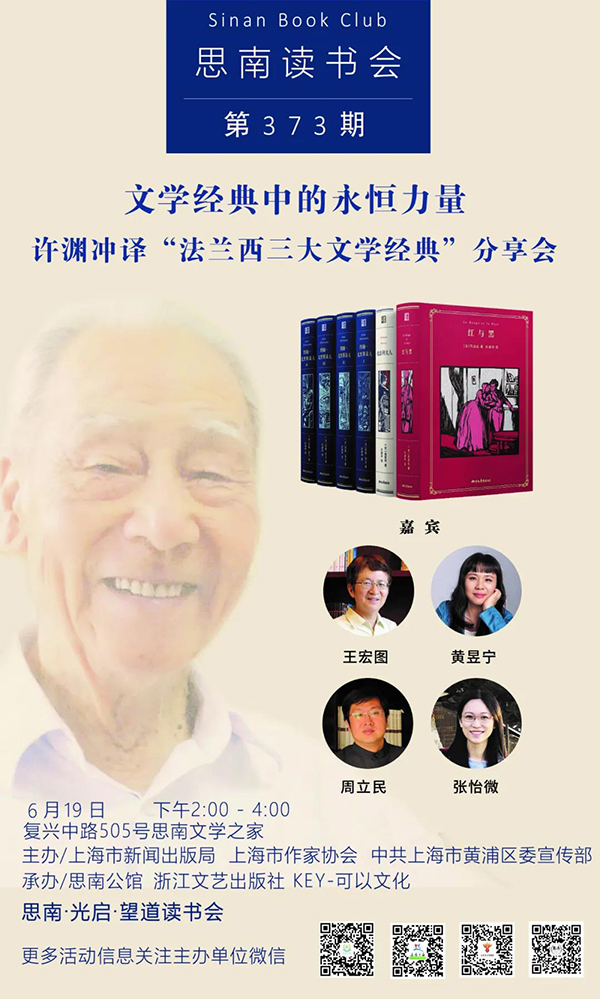
Shanghai | Eternal Power in Literary Classics —— Sharing Meeting on Xu Yuanchong’s Translation of "Three French Literary Classics"
Time:June 19th (Saturday) 14:00-16:00
Location:Sinan Literature House, No.505 Fuxing Middle Road, Huangpu District
Guest:Wang Hongtu (professor and doctoral supervisor of Chinese Department of Fudan University), Huang Yuning (publisher, translator and writer), Zhou Limin (executive deputy curator of Ba Jin’s former residence) and Zhang Yiwei (writer and teacher of Chinese Department of Fudan University).
Classical literary works provide endless nutrients for generations with their profound thoughts, beautiful language and eternal power across the times. The works translated by Mr. Xu Yuanchong, such as Red and Black, Madame Bovary and john cleese Dover, are all world classics that can provide people with spiritual growth value. On the occasion of Mr. Xu Yuanchong’s centenary birthday and the bicentennial of Flaubert’s birthday, Zhejiang Literature and Art Publishing House KEY- KEY has specially launched a commemorative edition of Xu Yuanchong’s centenary birthday, paying tribute to this great literary translator and this set of world classics that have influenced generations.
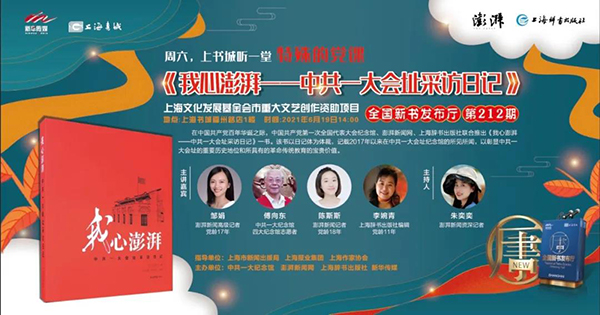
Shanghai | Listening to a Special Party Class —— A New Book Sharing Meeting of My Heart Surging —— Interview Diary of the First Congress of the Communist Party of China
Time:14:00 on June 19th (Saturday)
Location:1/F, Fuzhou Road Store, Shanghai Book City, No.465 Fuzhou Road, Huangpu District
Guest:Zou Juan (senior reporter of The Paper), Fu Xiangdong (retired teacher of Shanghai Health Medical College), Chen Sisi (reporter of The Paper) and Li Wanqing (editor of Shanghai Dictionary Publishing House).
On the occasion of the Communist Party of China (CPC)’s centenary birthday, the Memorial Hall of the First National Congress in communist party, China, The Paper. com and Shanghai Dictionary Publishing House jointly published the book My Heart Surges-Interview Diary of the First Congress of the Communist Party of China. In the form of diary, this book records what The Paper reporters saw and heard at the site of the First Congress of the Communist Party of China, so as to show the important historical position of the site of the First Congress of the Communist Party of China and the valuable value of revolutionary traditional education. This Saturday afternoon, several authors and publishers of the book, as well as Fu Xiangdong, a volunteer from the First Memorial Hall and the Fourth Memorial Hall of the Communist Party of China, will be guests in the new book publishing hall of Shanghai Book City to share the behind-the-scenes story of the birth of the book.
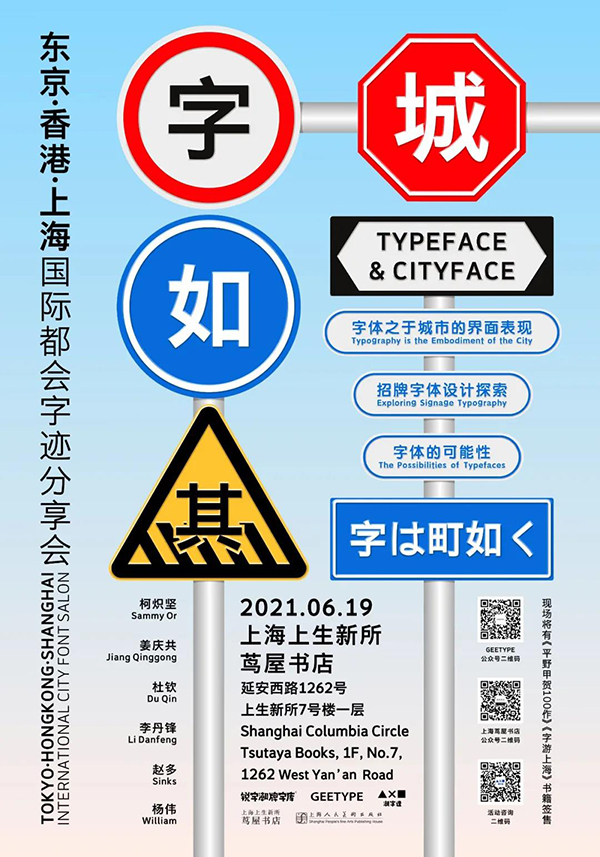
Shanghai | Words Like Its City: Tokyo, Hong Kong and Shanghai International Metropolis Handwriting Sharing Meeting
Time:June 19th (Saturday) 14:00-16:00
Location:Building 7, Shangsheng New Institute, No.1262 Yan ‘an West Road, Changning District
Guest:Ke Chijian (Visiting Professor of School of Design, Hong Kong Polytechnic University), Jiang Qinggong (Urban Culture Observer), Du Qin (Associate Professor of School of Design and Innovation/International School of Design and Innovation, Tongji University), Li Danfeng (Architect), Zhao Duo (Signboard Sketcher) and Yang Wei (Creative Director of Ruizi Chaopai Font Library).
The impact of fonts on the city’s interface performance, the exploration of signboard fonts, and whether there are more possibilities for fonts … We will share the urban handwriting stories told by graphic designers, font designers, architects and cultural observers who study urban design from an international perspective, and travel to different urban spaces with words as a guide. "Tokyo, Hong Kong and Shanghai" three cities take characters as a mirror. Let’s explore the possibility of characters together in all the spaces of the city.
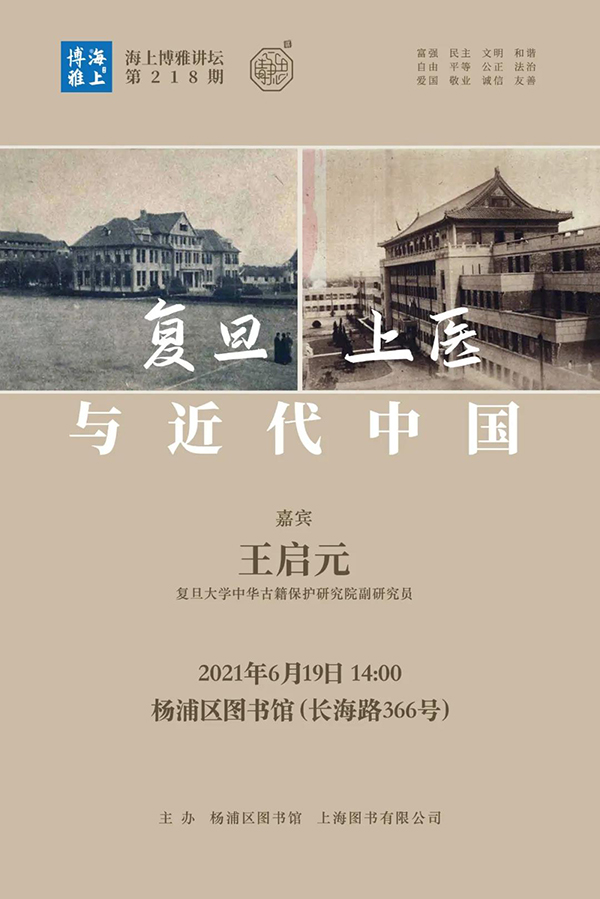
Shanghai | Fudan Shangyi and Modern China
Time:June 19th (Saturday) 14:00-16:00
Location:Multi-function hall on the second floor of Yangpu District Library, No.366 Changhai Road, Yangpu District
Speaker:Wang Qiyuan (Associate Research Fellow, Institute of Chinese Ancient Books Protection, Fudan University)
Shanghai Fudan University and Shanghai No.1 Medical College are both institutions of higher learning that still exist today and have had an important influence in modern history. Before their merger at the end of last century, the two famous universities experienced a long period of germination and growth, and trained countless outstanding students and teachers, making indelible contributions to the progress, development and modernization of modern China. What famous academic masters have emerged from these two prestigious schools at home and abroad? What kind of karma has happened between them? On June 19th, Wang Qiyuan, an associate researcher at the Chinese Ancient Books Protection Research Institute of Fudan University, will give detailed answers in the lecture on "Fudan Medical Treatment and Modern China" held by Yangpu District Library.
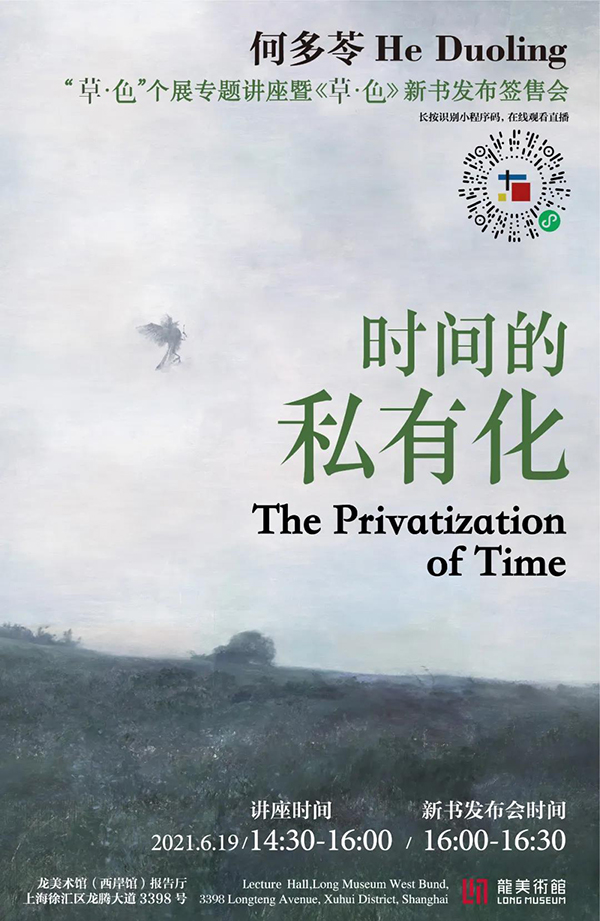
Shanghai | The Privatization of Time: He Duoling’s "Grass and Color" solo exhibition lecture and the new book release signing ceremony of "Grass and Color"
Time:June 19th (Saturday) 14:30-16:00
Location:Lecture hall, 2nd floor, Long Art Museum (Xi ‘an Pavilion), No.3398 Longteng Avenue, Xuhui District
Guest:He Duoling (artist), Zhu Zhu (poet, curator, art critic), Liu Zhen (deputy academic director of Shanghai Himalayas Art Museum)
From April 25th to June 20th, He Duoling’s large-scale solo exhibition "Grass and Color", curated by the famous poet Zhu Zhu, was exhibited at the Long Art Museum (West Coast Pavilion). On June 19th, a special lecture on solo exhibition: Privatization of Time will be held, with Shen Qilan as the host. Artist He Duoling, curator Zhu Zhu and art critic Liu Zhen will gather in the lecture hall of Dragon Art Museum (West Coast Pavilion) to interact with the audience and discuss this exhibition and He Duoling’s artistic creation for more than 40 years.
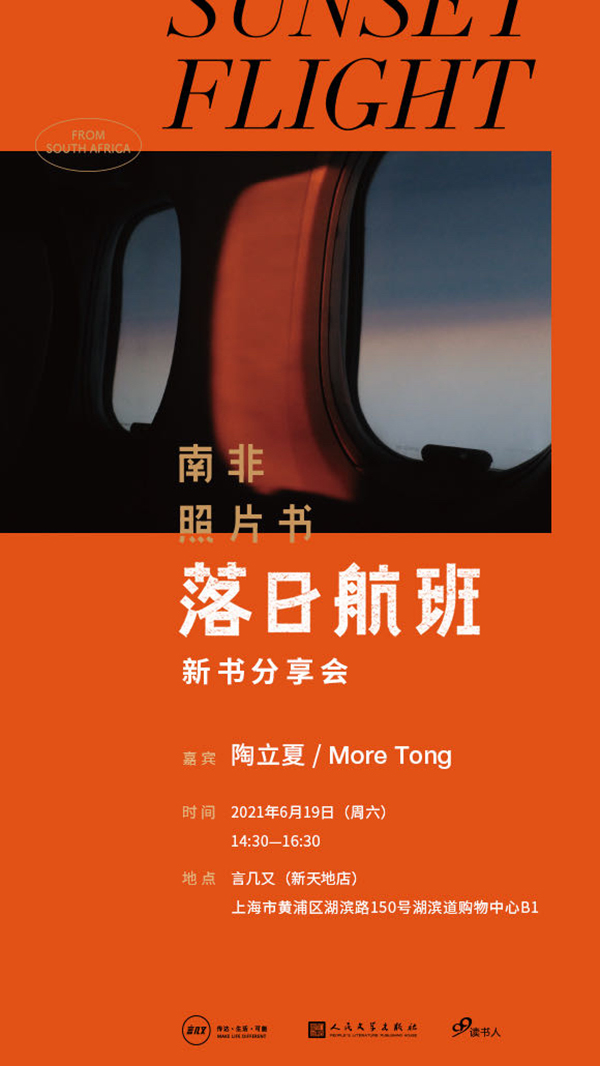
Shanghai | South Africa Photo Book "Sunset Flight" New Book Sharing Meeting
Time:June 19th (Saturday) 14:30-16:30
Location:B1 Yanjiyou Bookstore, Hubin Road Shopping Center, No.150 Hubin Road, Huangpu District
Speaker:Tao Lixia (writer and translator)
On Saturday afternoon, the best-selling author Tao Lixia will visit Yanjiu Bookstore to share her new book Sunset Flight.
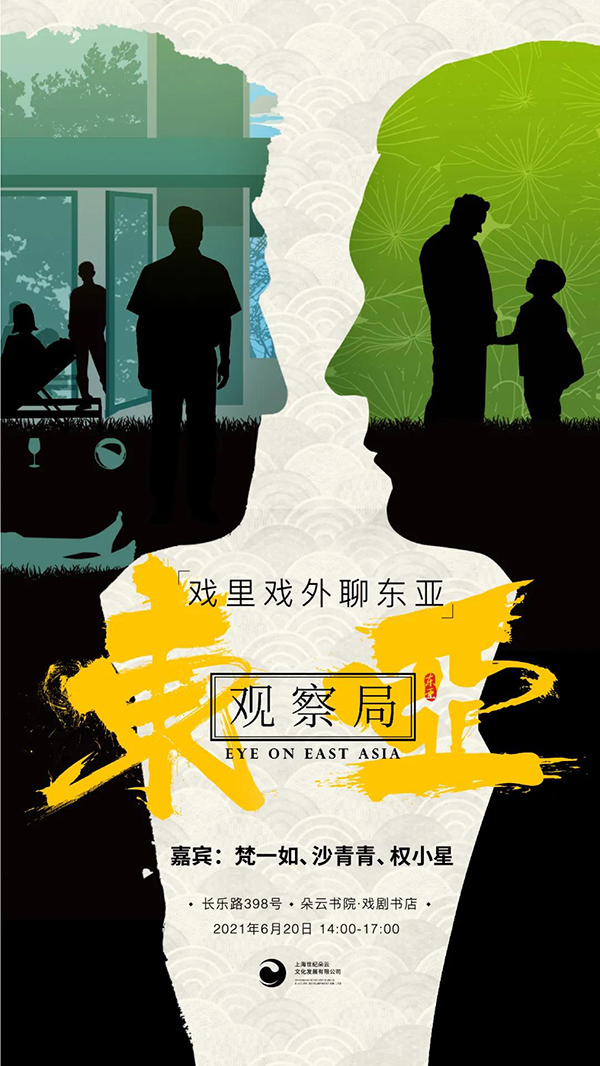
Shanghai | Talk about East Asia in and out of the play
Time:June 20th (Sunday) 14:00-17:00
Location:Duoyun Academy Drama Store, No.398 Changle Road, Huangpu District
Guest:Fan Yiru (media person), Sha Qingqing (deputy director of Shanghai Library Historical Documentation Center) and Quan Xiaoxing (media person).
After watching so many Japanese and Korean dramas, do you really know our neighbors Japan and South Korea? Is Naoki Banzawa, a miracle of viewing in the Heisei era in Japan, really a masterpiece in the workplace? What is the workplace culture of traditional Japanese companies? Why "Midnight Food Store" resonates with China and South Korea … You can find the answers to these questions in the popular podcast program "East Asia Observatory". On the afternoon of June 20th, we invited three anchors to the Duoyun Academy and Drama Store to talk about the hot cultural topics in Japan and South Korea during this year, including film and television, art and so on, and feel the "change" and "unchanged" of East Asian society.
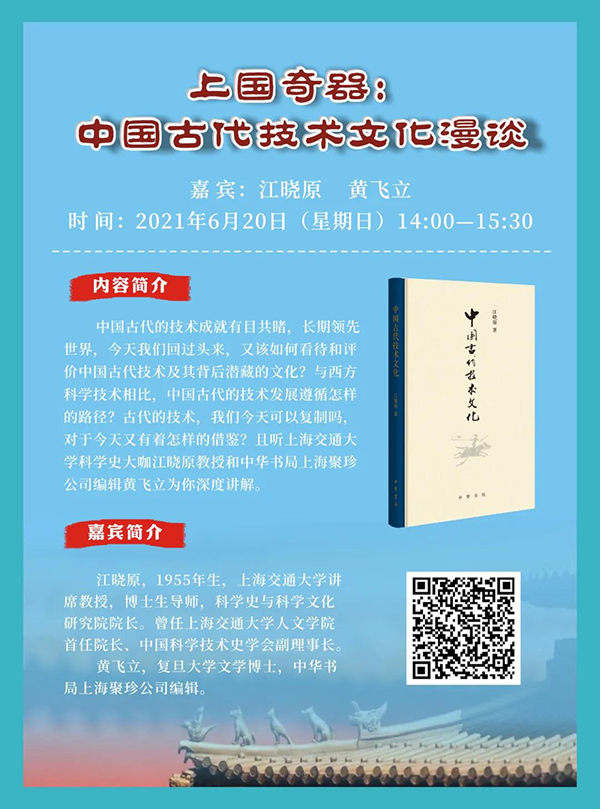
Shanghai | Wonders of the State: A Random Talk on China’s Ancient Technology and Culture
Time:June 20th (Sunday) 14:00-15:30
Location:Chinese version study room on the first floor of Oriental Century Building, No.345 Xianxia Road, Changning District
Guest:Jiang Xiaoyuan (Professor and Doctoral Supervisor of Shanghai Jiaotong University) and Huang Feili (Book Editor)
China’s ancient technological achievements are obvious to all, leading the world for a long time. Today, when we look back, how should we view and evaluate China’s ancient technology and the culture behind it? Compared with western science and technology, what path did China’s ancient technological development follow? Can we copy the ancient technology today? What is the reference for today? And listen to Professor Jiang Xiaoyuan, a big coffee maker in the history of science in Shanghai Jiaotong University, and Huang Feili, editor of Zhonghua Book Company, for your in-depth explanation.
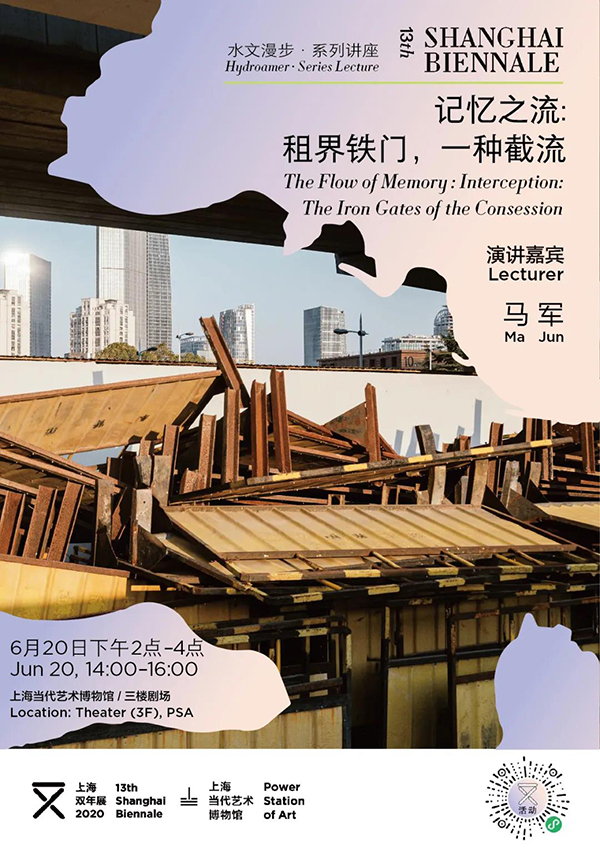
Shanghai | Stream of Memory: Iron Gate of Concession, a River Closure
Time:June 20th (Sunday) 14:00-16:00
Location:3F Theater of Shanghai Museum of Contemporary Art, No.678 Miaojiang Road, Huangpu District
Speaker:Ma Jun (Director, Modern History Research Office, Shanghai Academy of Social Sciences)
The people staying in the city are like the surges and blockages of water bodies, in which there are countless forces interacting, and finally they always leave vague but traceable marks. The iron gate in the concession in Shanghai history is such a story. From Shiliupu to the French-Chinese border of Xieqiao, the French Concession authorities built nearly 40 iron gates in front of and behind the major traffic points. The iron gate in the concession lasted for 20 years from the beginning of construction to the final demolition in early 1946. In the meantime, their opening and closing, full opening and half closing, and the need to check the license until they are completely passed, all have a great impact on the political, economic and social life of Shanghai. The micro-narration of the role of these iron gates in the city in history can give us a glimpse of the living conditions in Shanghai at that time and think about the factors and influences that blocked the flow.
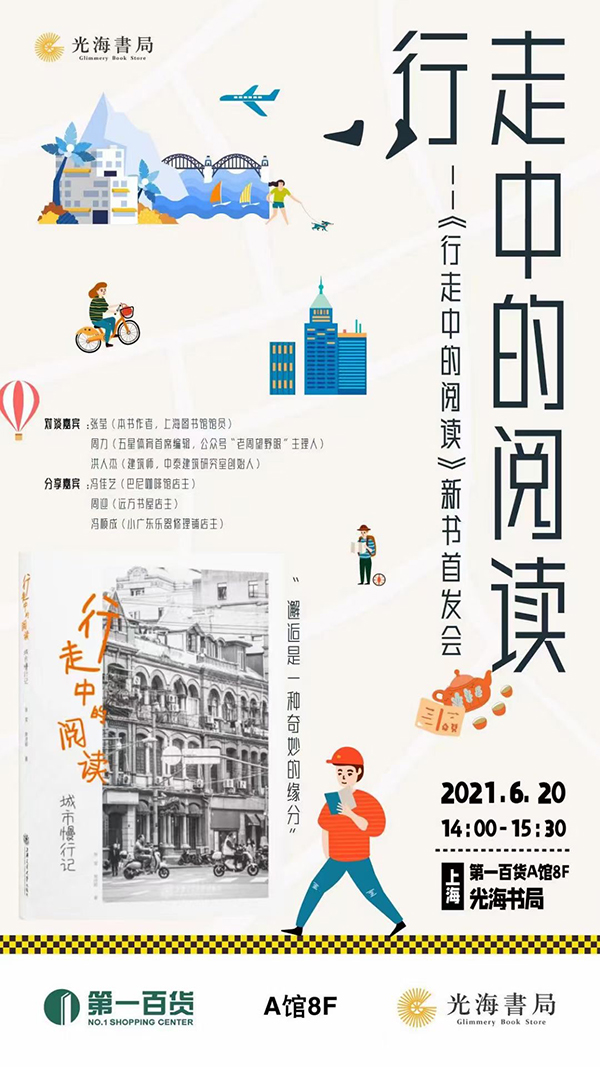
Shanghai | Reading on Walking —— The Launch Conference of the New Book Reading on Walking
Time:June 20th (Sunday) 14:00-15:30
Location:F8 Guanghai Bookstore, First Department Store Commercial Center, No.830 Nanjing East Road, Huangpu District
Guest:Zhang Ying (Shanghai Librarian), zhou li (Sports Commentator), Hong Renjie (Architect), etc.
This Sunday afternoon, Zhang Ying will bring her new book "Reading on the Move-A Slow Travel in the City" to meet you at Guanghai Bookstore and share the reading on the move with several guests. How to "read" a city? Zhang Ying gave her answer in the book: take a step, take a walk on the streets of the city, look at the unique buildings and shops, take away a story, or leave a memory.
Shanghai | "Green Pepper" Dilemma and Solution —— Tongji Bookstore’s "From Green Pepper to Thinker" Reading Club
Time:June 23rd (Wednesday) 14:00-16:00.
Location:Tongji Bookstore, No.2 Chifeng Road, Yangpu District
Speaker:Zhu Dajian (Director, Institute of Sustainable Development and Management, Tongji University)
Young teachers in colleges and universities are falling into a kind of group anxiety, especially under the influence of the system of "promotion or leaving", the professional dilemma and performance pressure they face are becoming more and more prominent. How to relieve the anxiety and confusion of university "green peppers", Professor Zhu Dajian, a senior liberal arts professor at Tongji University, will not only give the solution in the book "From Green Pepper to Thinker", but also communicate face to face with readers during the activity.
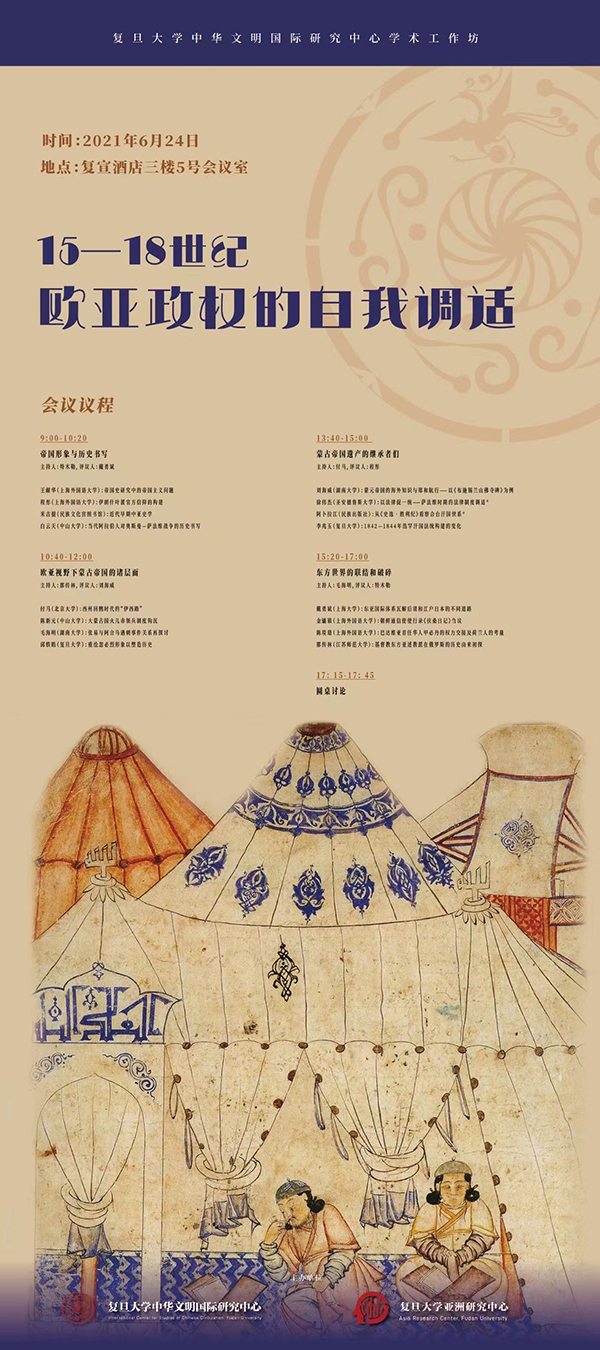
Shanghai | The Self-adjustment of Eurasian Regime in 15th-18th Century
Time:June 24th (Thursday) 9:00-17:45.
Location:Meeting Room 5, 3rd Floor, Fuxuan Hotel, No.400 Guoding Road, Yangpu District
Guest:Wang Xianhua (Professor, Institute of Global Civilization History, Shanghai International Studies University), Fu Ma (Assistant Professor and Researcher, Peking University History Department and China Ancient History Research Center), Abla Jiang (Ethnic Publishing House), etc.
This workshop will be divided into four parts: the image of the empire and historical writing, various aspects of the Mongolian empire from the perspective of Europe and Asia, the inheritors of the heritage of the Mongolian empire and the connection and fragmentation of the eastern world. Scholars will publish their own thematic reports and make comments.
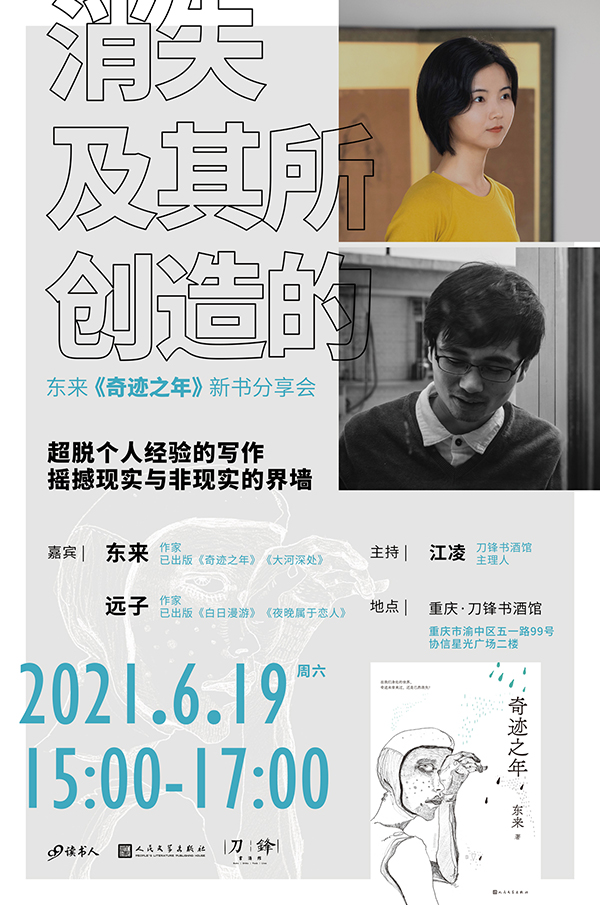
Chongqing | Disappeared and Created —— A New Book Sharing Meeting of the Year of Miracles in Donglai
Time:June 19th (Saturday) 15:00-17:00
Location:Blade book tavern on the second floor of Xiexin Xingguang Plaza, No.99 Wuyi Road, Yuzhong District
Guest:Donglai (writer) and Yuanzi (writer)
On the afternoon of June 19th, the writer Donglai came to Chongqing from Shanghai in the east, visited Chongqing Blade Book Tavern with his long-lost friend, writer Yuanzi, and chatted with Jiang Ling, the bookstore manager.
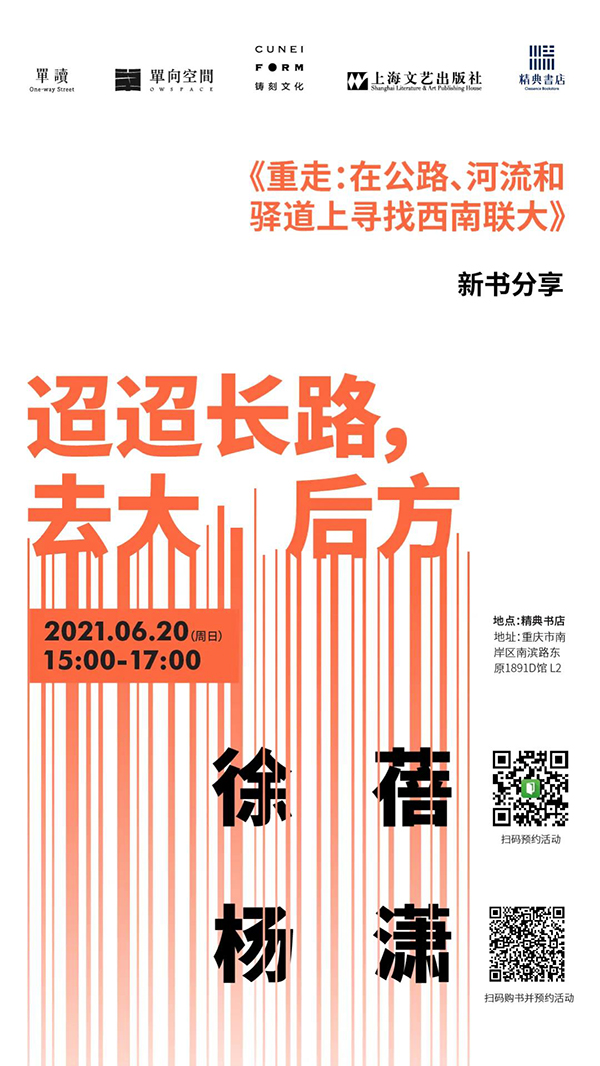
Chongqing | A Long Way to the Home Front —— Sharing the new book "Going Back: Looking for The National SouthWest Associated University on Roads, Rivers and Post Roads"
Time:June 20th (Sunday) 15:00-17:00
Location:Nan ‘an District Nanbin Road Dongyuan Hall 1891D L2 Classic Bookstore
Guest:Xu Bei (director), Tigerson Yang (reporter, writer)
Tigerson Yang’s new book "Walking Again" attempts to go back to the starting point of the legend of The National SouthWest Associated University through walking and writing, and to explore the historical efforts of going to the rear area. Director Xu Bei’s latest film, One Day When We Were Young, invites the post-1990s old people who are over 90 years old to tell their own stories about this road and the memories of youth of this university. On June 20th, we invited two distinguished guests, Xu Bei and Tigerson Yang, to Chongqing, where they shared this memory and the past. We also thought together, when the flood of the times engulfed us and our common ideals and values were constantly questioned and challenged, did the spiritual rear exist? Where should we go?
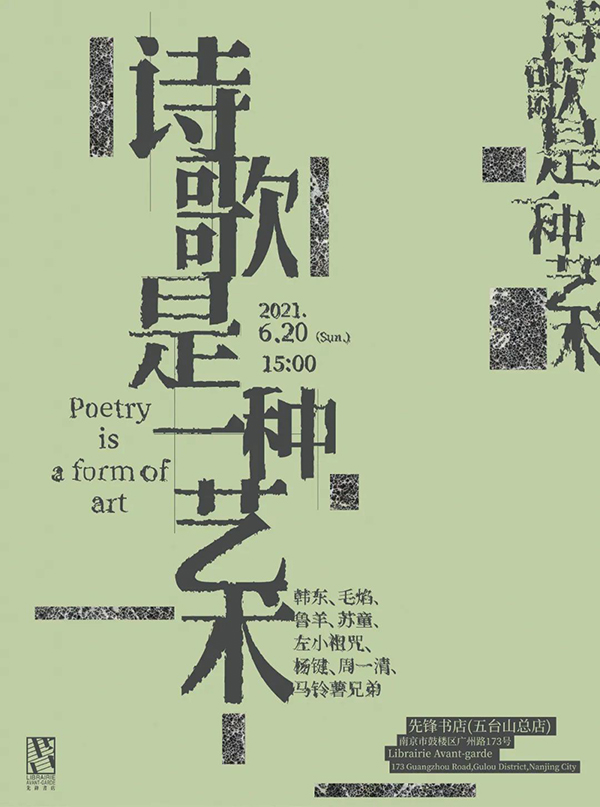
Nanjing | Poetry is an art.
Time:15:00 on Sunday, June 20th.
Location:Pioneer bookstore, No.173 Guangzhou Road, Gulou District
Guest:HanDong (novelist, poet, screenwriter), Lu Yang (novelist, poet), Mao Yan (artist), Su Tong (writer), Yang Jian (poet), Zhou Yiqing (professor of printmaking department, Academy of Fine Arts), zuoxiao zuzhou (musician) and Potato Brothers (poet).
HanDong, Mao Yan, Lu Yang and Yu Xiaowei, four different names, intersect in poetry. With the accumulation of their friendship over the years, their equal and mutually confirmed relationship in creation also enabled the four men to continue to exert a new force in the so-called "struggle" that constantly collided. On the afternoon of June 20th, the poet HanDong, the poet and painter Mao Yan, the poet Lu Yang, the writer Su Tong, the artist zuoxiao zuzhou, the poet Yang Jian, the artist Zhou Yiqing and the poet Potato Brothers will come to the head office in Wutaishan, pioneer bookstore, to approach the truth of poetry with a cross-disciplinary exchange.
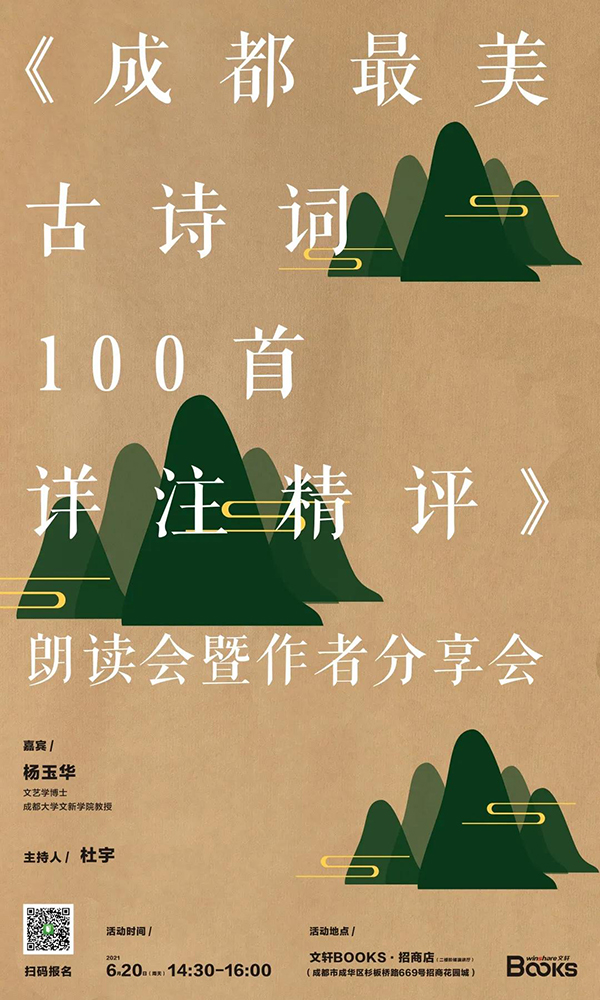
Chengdu | Reading Meeting and Author Sharing Meeting of 100 Most Beautiful Ancient Poems in Chengdu
Time:June 20th (Sunday) 14:30-16:00
Location:Lecture hall on the second floor of Wenxuan BOOKS, China Merchants Garden City, No.669 Shanbanqiao Road, Chenghua Avenue, chenghua district
Speaker:Yang Yuhua (Professor, Wenxin College, Chengdu University)
Chengdu has always been an important town of China’s poetry, with many famous works of past dynasties. Now, a book "100 Most Beautiful Ancient Poems in Chengdu" includes them all. On June 20th, we invited Yang Yuhua, the author of 100 Most Beautiful Ancient Poems in Chengdu, to share the beauty and truth in these ancient poems with us.
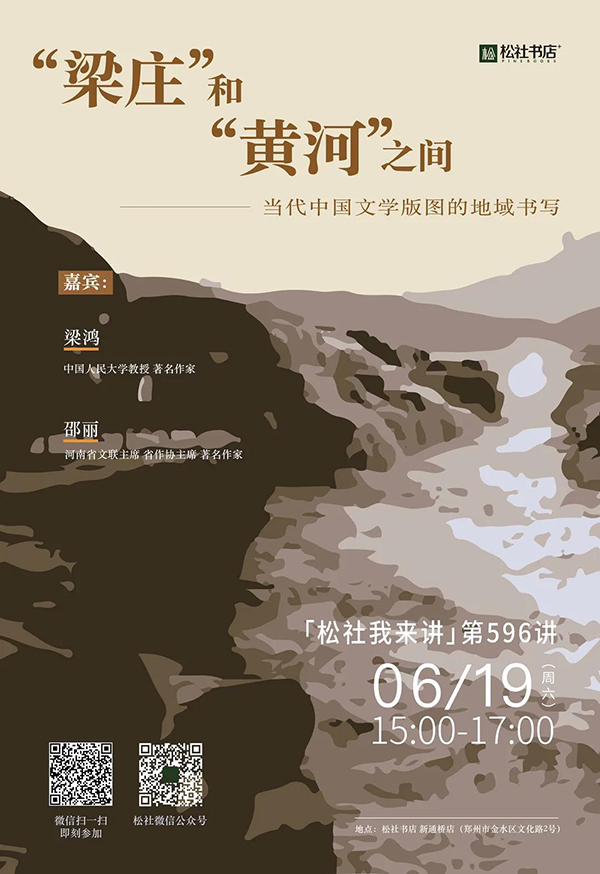
Zhengzhou | Between "Liangzhuang" and "Yellow River" —— Regional Writing of Contemporary China Literature Territory
Time:June 19th (Saturday) 15:00-17:00
Location:Jinshui District Wenhua Road No.2 Songshe Bookstore
Guest:Liang Hong (Professor and Writer of China Renmin University) and Shao Li (Writer)
Ten years after the publication of China in Liangzhuang, Liang Hong continued to write Liangzhuang for ten years. On Saturday afternoon, Liang Hong, a professor at China Renmin University, and Shao Li, chairman of Henan Federation of Literary and Art Circles, will visit Songshe together. I will bring readers works such as Ten Years of Liangzhuang and Yellow River Story, tell a typical story of China, and discuss the regional writing of contemporary China literature territory.

